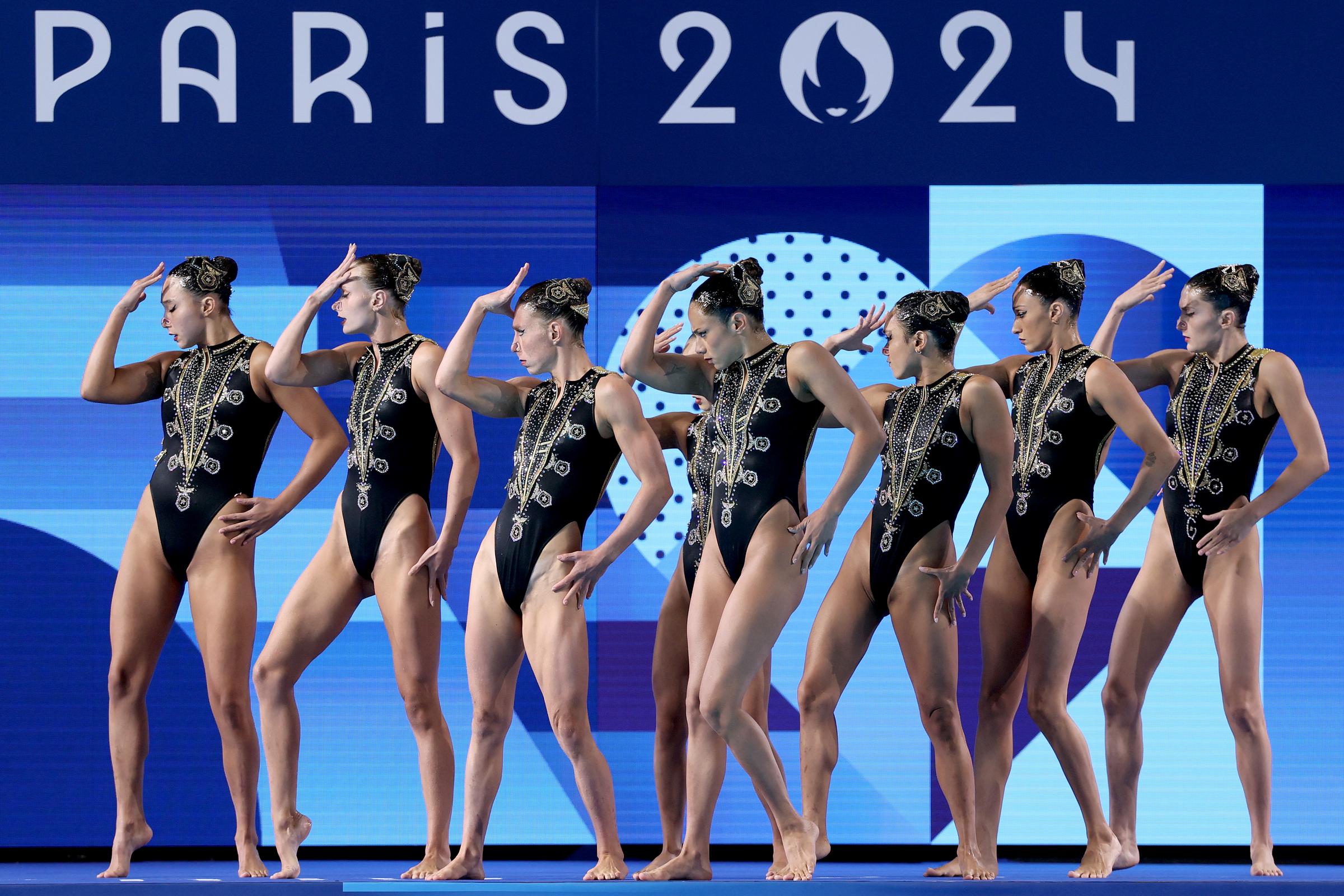
Team USA competes in the Team Technical Routine at the Olympic Games Paris 2024 in Paris, France, on August 5, 2024. | Source: Getty Images
Team USA’s artistic swimming team quickly went viral on social media for their technical routine in the water at the 2024 Paris Olympics. They amazed viewers as they swiftly flipped upside down, performing a moonwalk with their feet above the water.
These highlights have generated intrigue about the sport’s unique challenges. Fans wonder how artistic swimmers keep their hair perfect underwater, which is just one of the four unique demands of the sport.
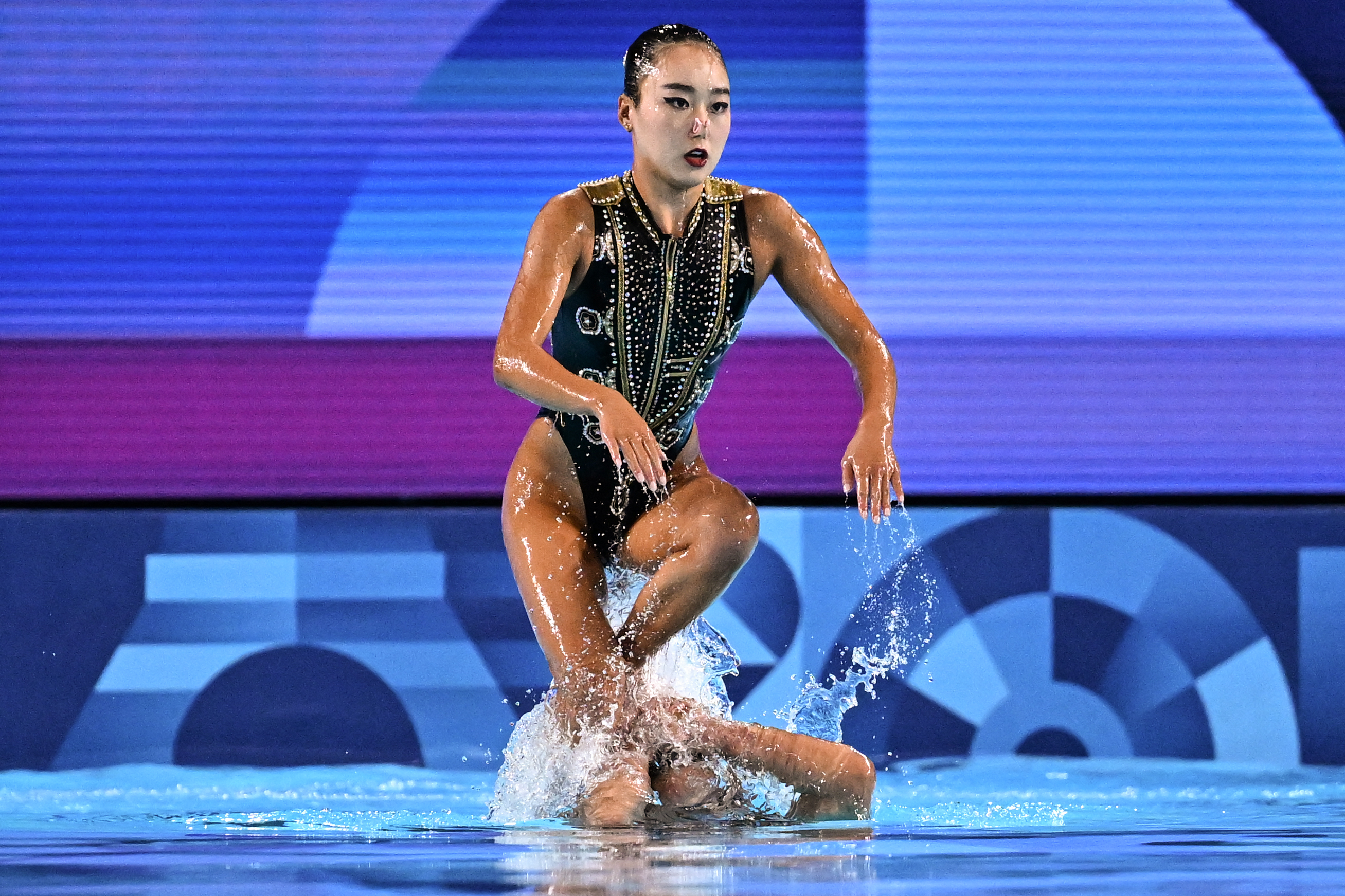
Team USA competes in the team technical routine of the artistic swimming event during the Paris 2024 Olympic Games in Saint-Denis, north of Paris, on August 5, 2024. | Source: Getty Images
USA’s artistic swimming team executed a sensational routine to the tune of Michael Jackson’s “Smooth Criminal” at the Aquatic Centre just outside Paris. The eight-person team was elated to clinch a silver medal for their outstanding performance in artistic swimming mixed acrobatic team routine.
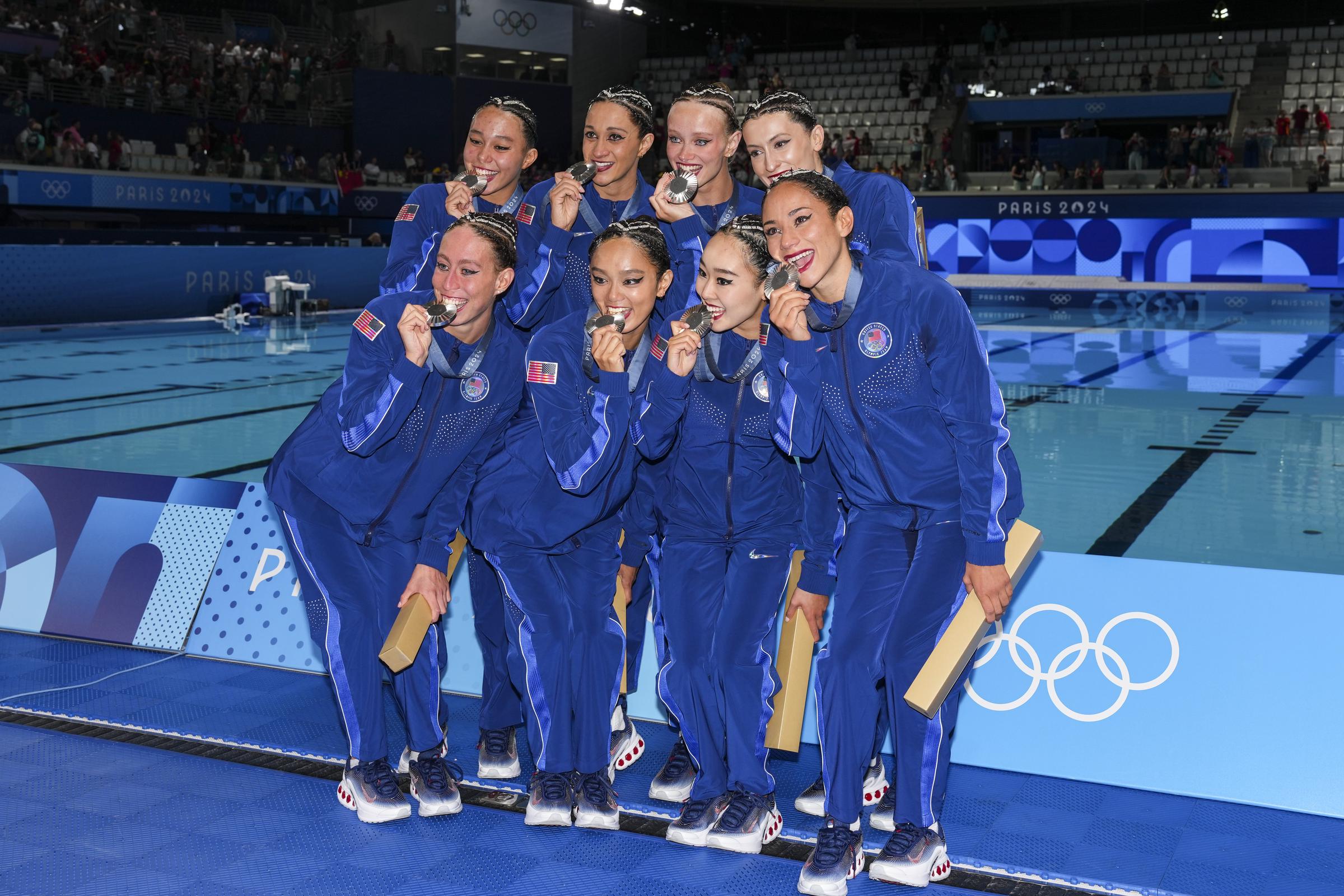
Silver medalists of Team USA pose after Team Acrobatic Routine of the Artistic Swimming during the Paris 2024 Olympics Games in Paris, France, on August 7, 2024. | Source: Getty Images
For two decades, the once-dominant artistic swimming team had missed the podium. So, the current team was jubilant to win the first Olympic artistic swimming medal for the US in 20 years.
The person in charge of the choreography that led to the win was Andrea Fuentes, the team’s head coach and a four-time Olympic medalist for Spain. The acrobatic routine revolved around the themes of sorcery and miracles.
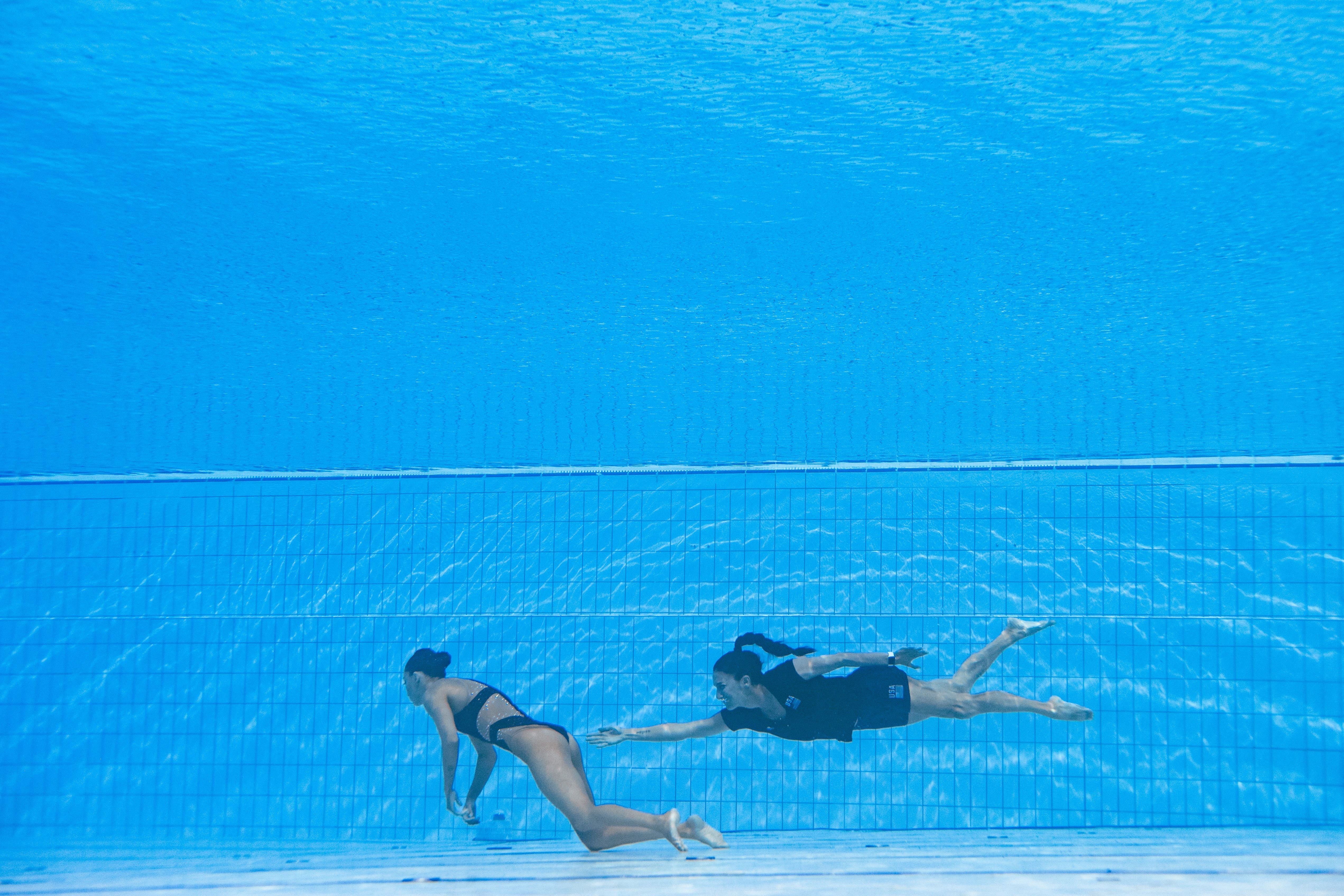
Andrea Fuentes recovers Anita Alvarez from the bottom of the pool during an incident in the women’s solo free artistic swimming finals, at the Budapest 2022 World Aquatics Championships in Budapest on June 22, 2022. | Source: Getty Images
“It was magic. It had been a dream of a system that we have created,” said Fuentes. Anita Alvarez, the first three-time Olympian for artistic swimming said their coaches told them that the crowd went crazy when they performed.
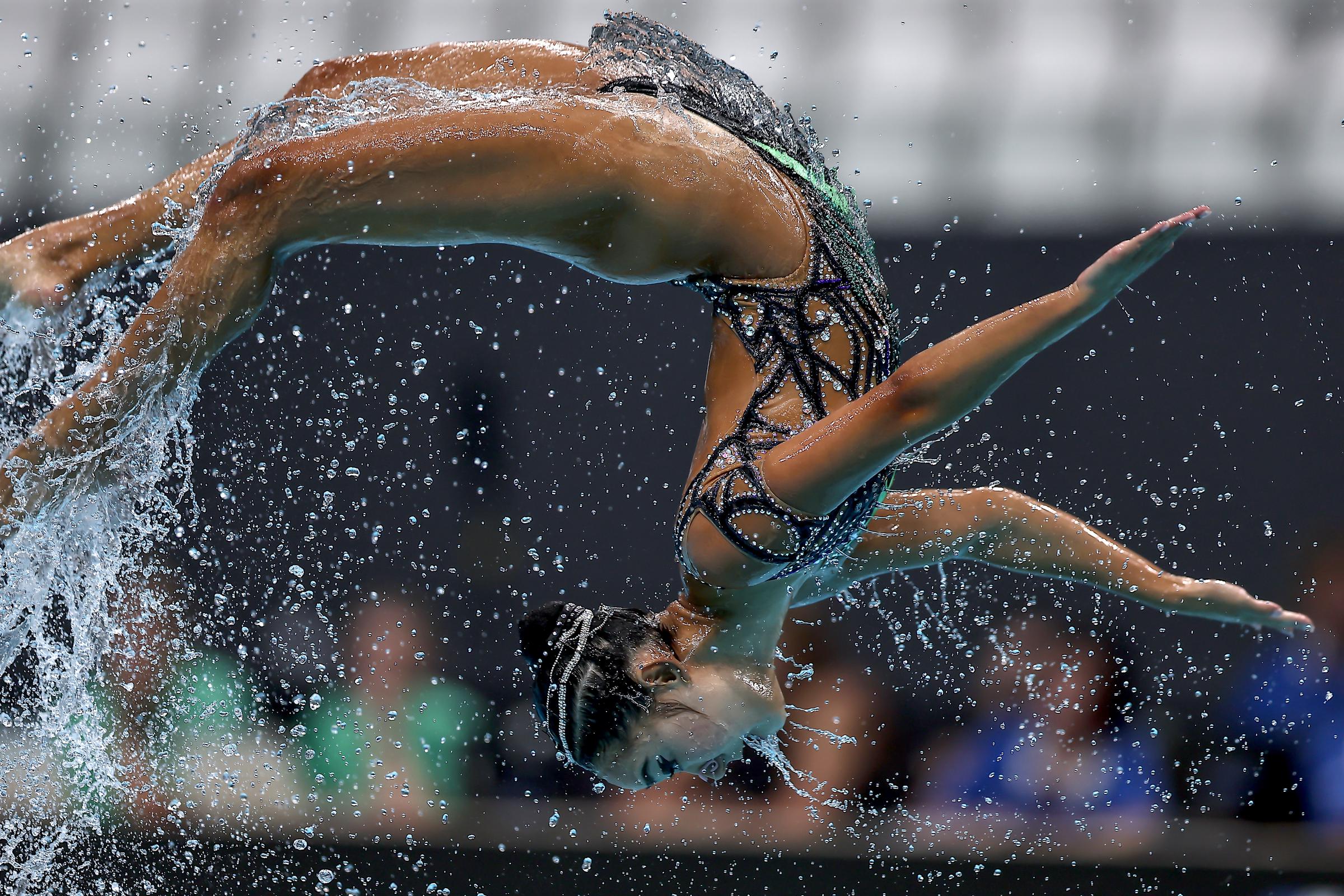
Team of USA compete in the Open Acrobatic Routine Final at the World Aquatics Artistic Swimming World Cup Super Final Budapest 2024 in Budapest, Hungary, on July 6, 2024. | Source: Getty Images
“And now we’re seeing videos blow up all over the internet, which I think is great for the sport. Anything to help grow the sport,” she gushed.
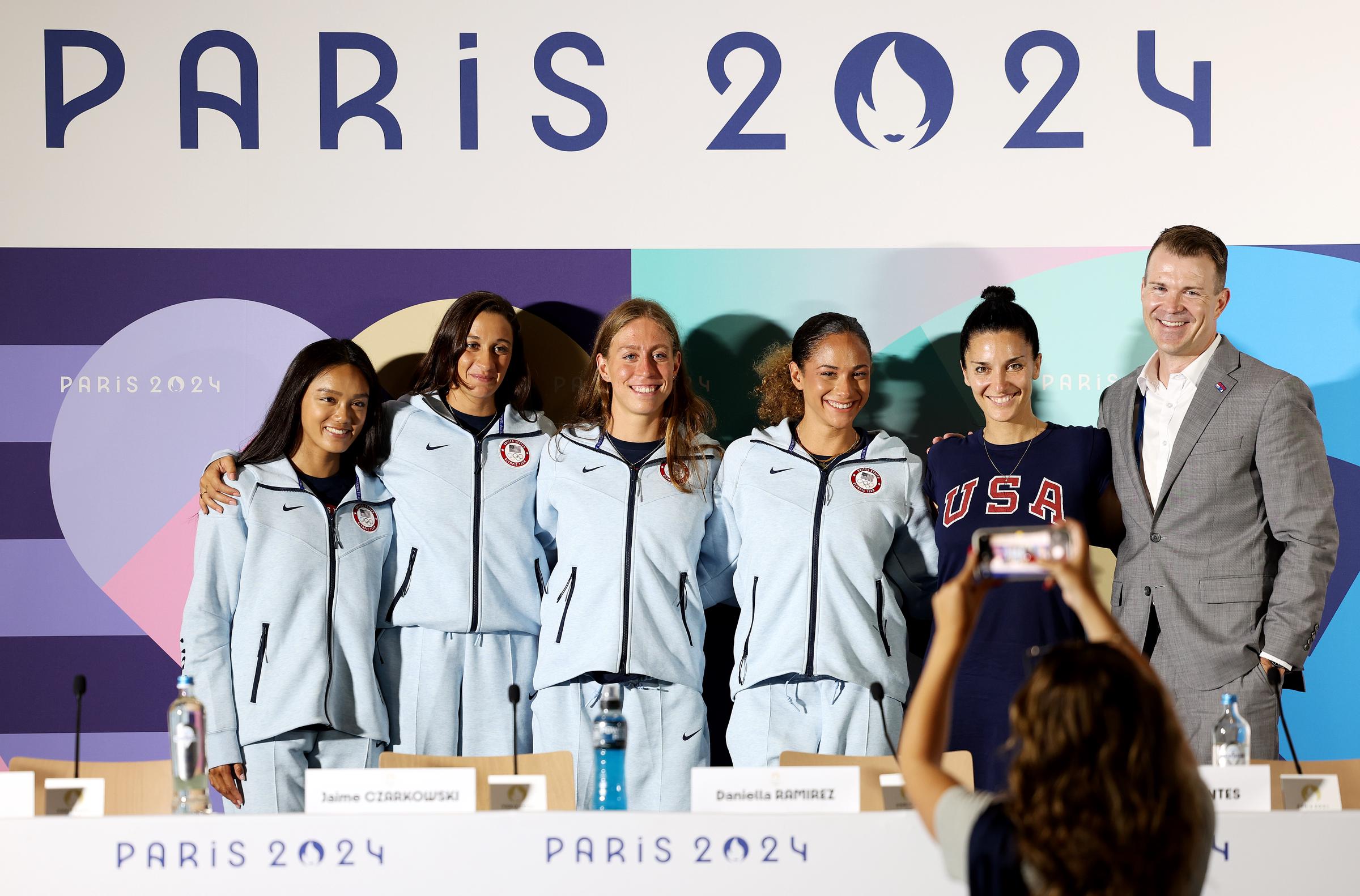
Jacklyn Luu, Anita Alvarez, Jaime Czarkowski, Daniella Ramirez, Andrea Fuentes, and Adam Andrasko, CEO of Team USA during the artistic swimming press conference at the Olympic Games Paris 2024 in Paris, France, on July 31, 2024.
This win didn’t come easy for Team USA as it was marked by a series of unexpected challenges. First, they selected an athlete, Audrey Kwon, with a fear of heights to perform daring acrobatic moves.

USA’s Artistic Swimming team during the Team Acrobatic Routine at the 2024 Paris Olympic Games in France, on August 7, 2024. | Source: Getty Images
Secondly, they experienced a frightening moment when a team member fainted and nearly drowned in the pool. They narrowly missed qualifying for the Olympics at the 2023 Pan American Games by less than a point.
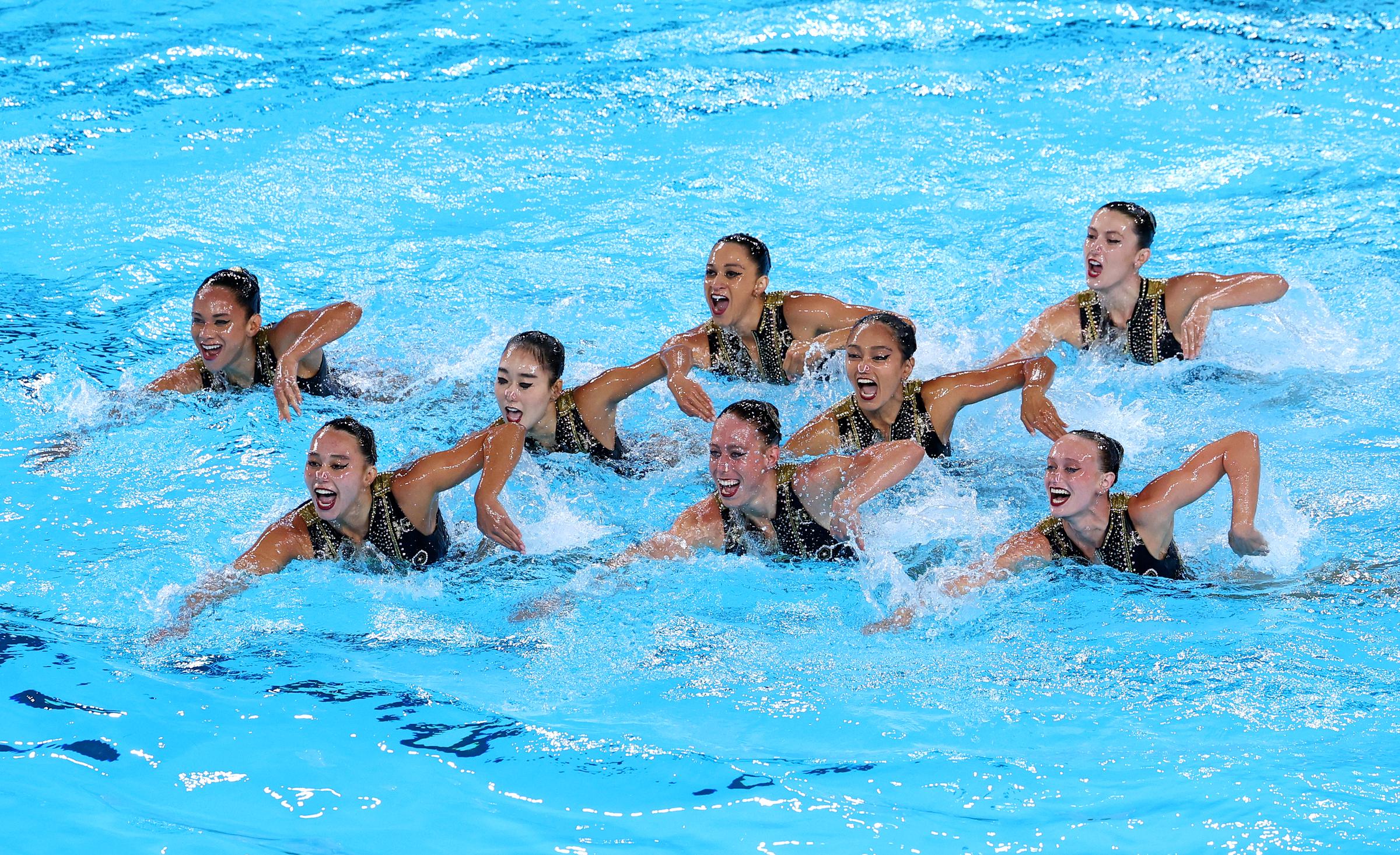
Members of Team USA compete in the Team Technical Routine at the Olympic Games Paris 2024 in Paris, France, on August 5, 2024. | Source: Getty Images
However, they took a bold step by adding a 44-year-old male swimmer to the team. Against all odds, Team USA ultimately secured a spot in the Olympics, marking their first team qualification since 2008.
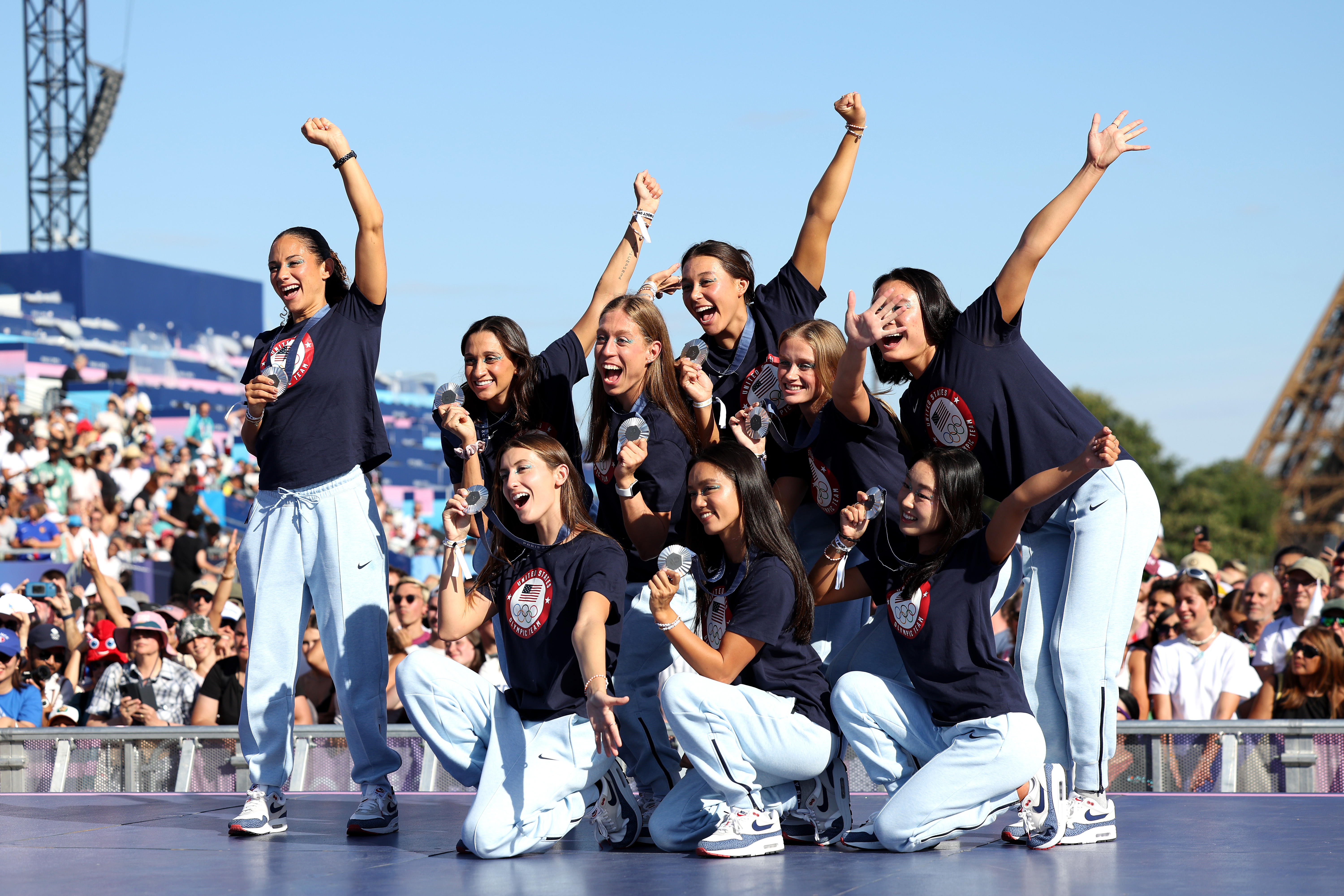
Team USA Artistic Swimming silver medalists pose for a photo with their medals at the Olympic Games Paris 2024 in Paris, France, on August 8, 2024. | Source: Getty Images
Furthermore, Fuentes helped Kwon deal with her acrophobia. To overcome her fear of heights, Kwon spent three months eating breakfast on the pool’s diving platform. This daily routine gradually helped her build confidence while being perched so high up.
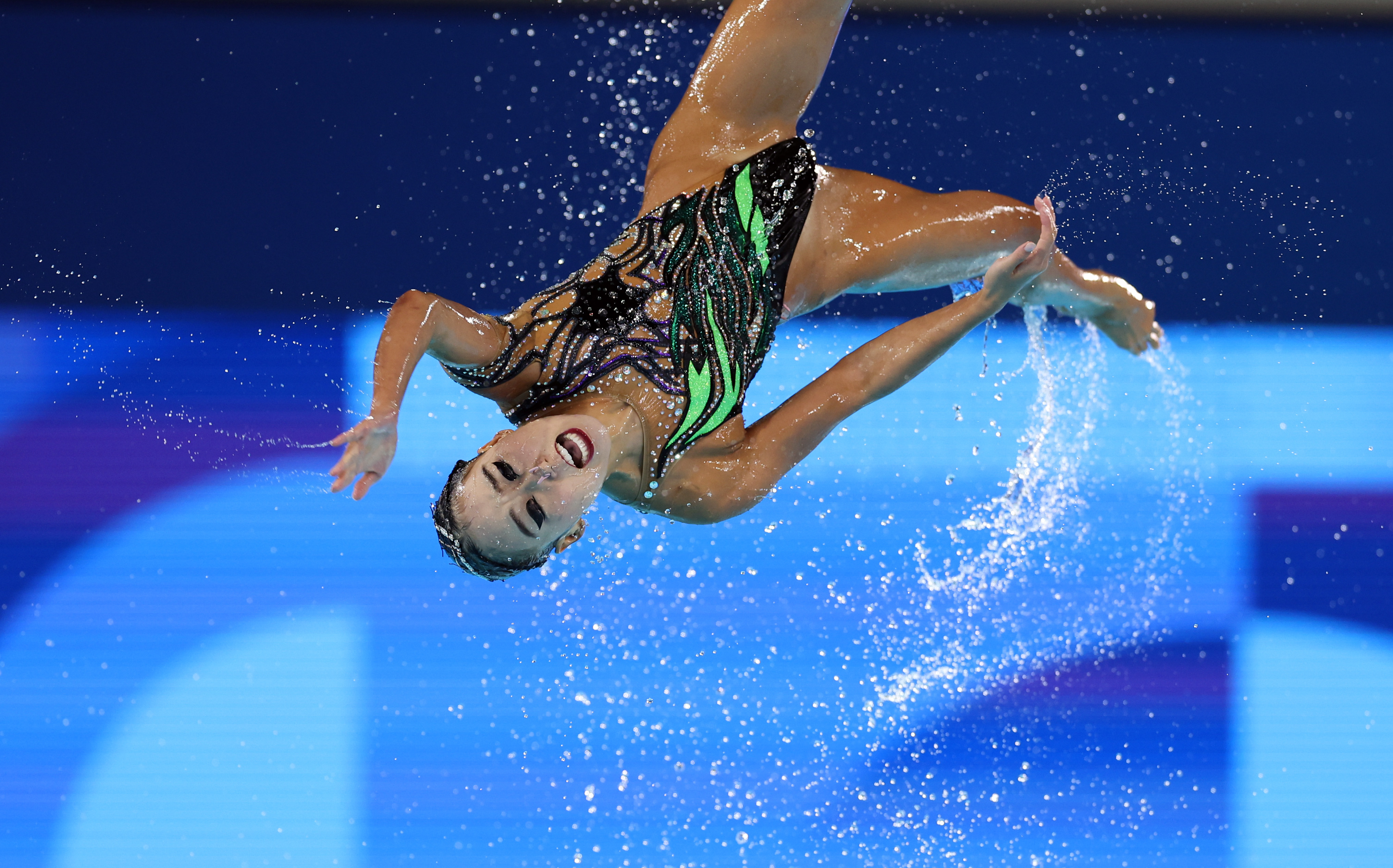
Member of Team USA competes in the Team Acrobatic Routine at the Olympic Games Paris 2024 in Paris, France, on August 7, 2024.
The team also had a ritual termed the “The Friday Challenge,” which drove the athletes to continually push the boundaries of difficulty in their routines.
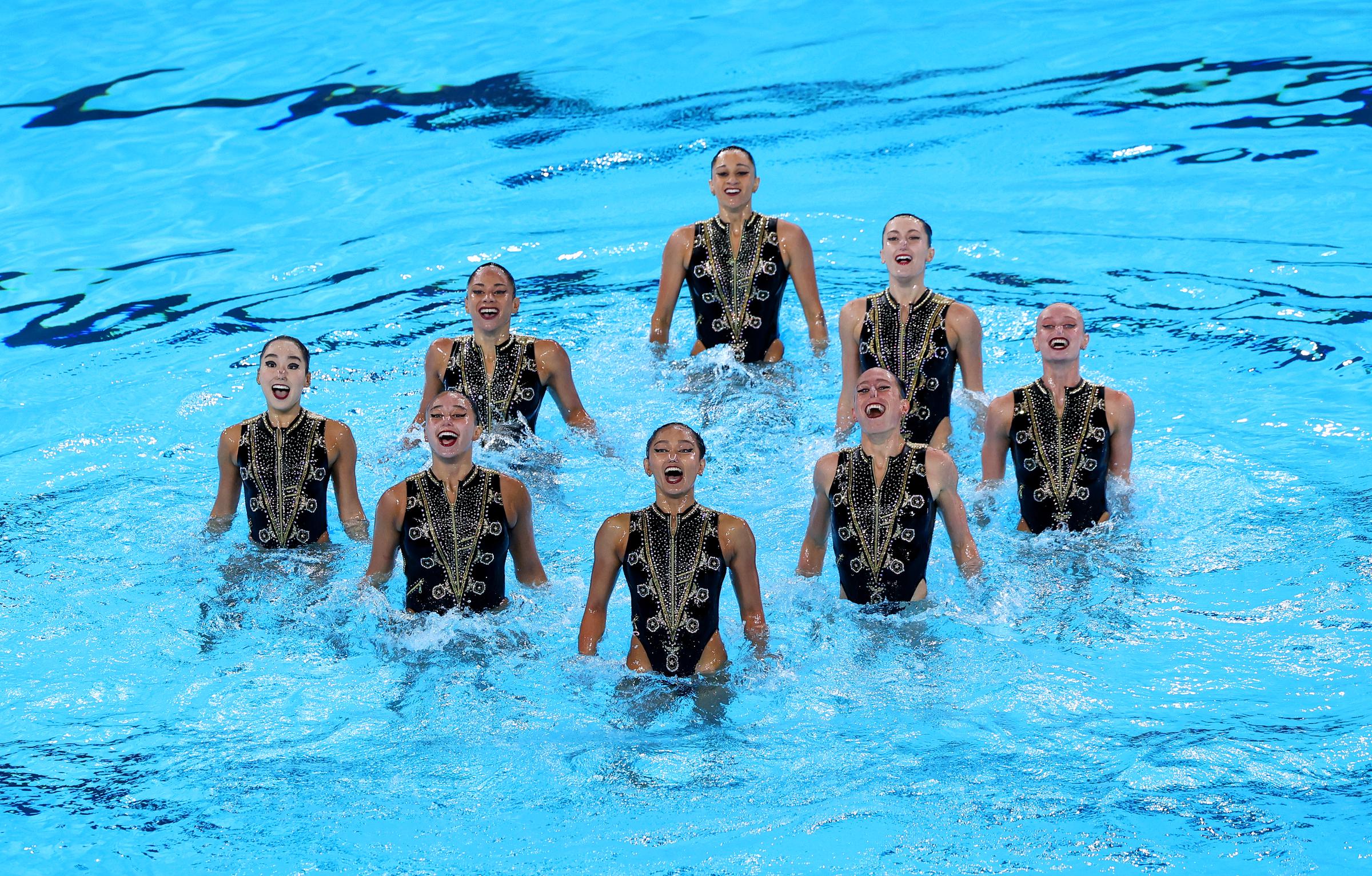
Members of Team USA compete in the Team Technical Routine at the Olympic Games Paris 2024 in Paris, France, on August 5, 2024. | Source: Getty Images
Each week, the team tackled unconventional tasks related to their sport. One example involved a challenge to leap over swimming flags without touching them, a feat that took three weeks to master.
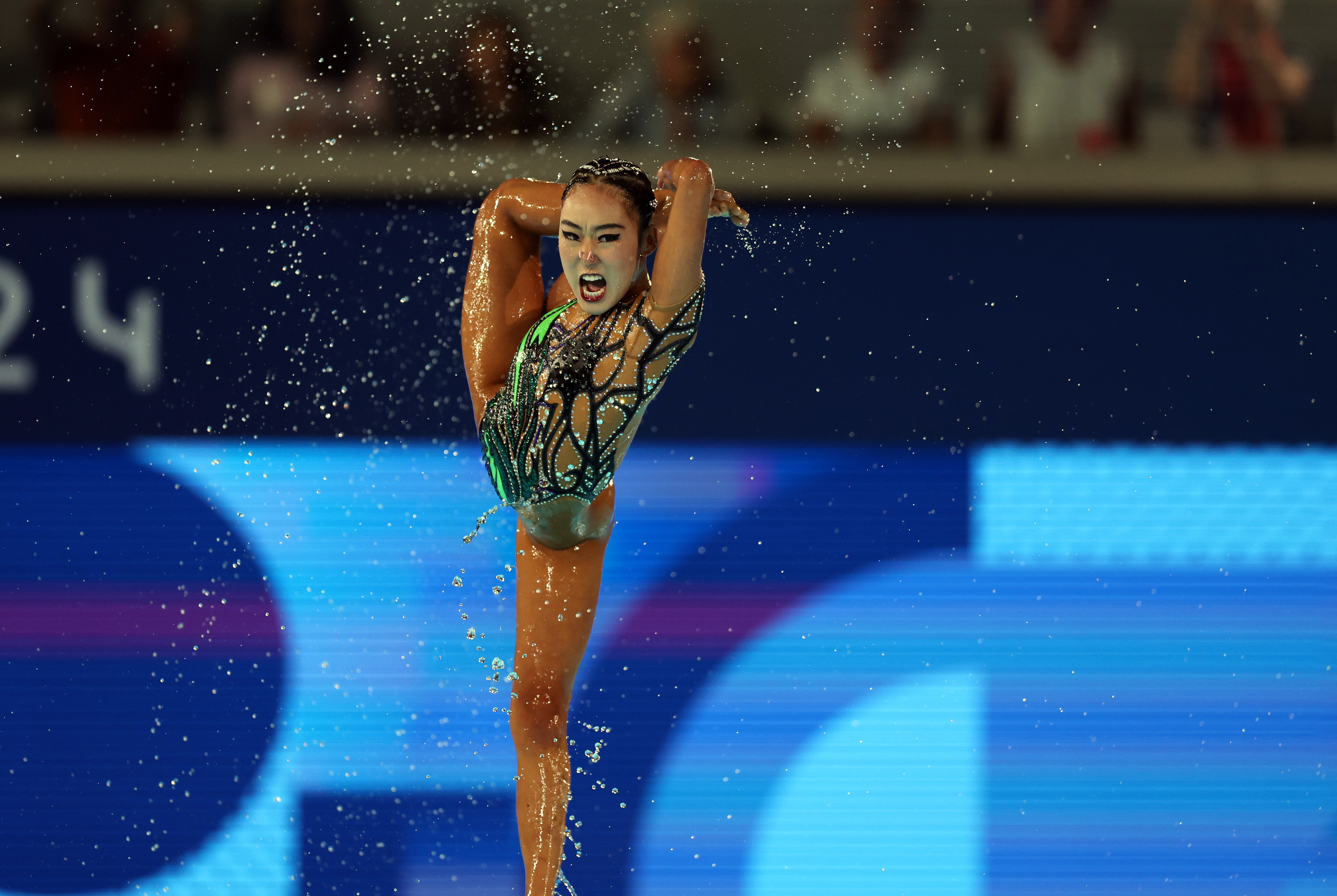
Member of Team USA competes in the Team Acrobatic Routine at the Olympic Games Paris 2024 in Paris, France, on August 7, 2024.
Another challenge required creating a six-minute platform routine with a final jump to land. These demanding tasks not only fostered team-building but also helped prepare the athletes for any future challenges.
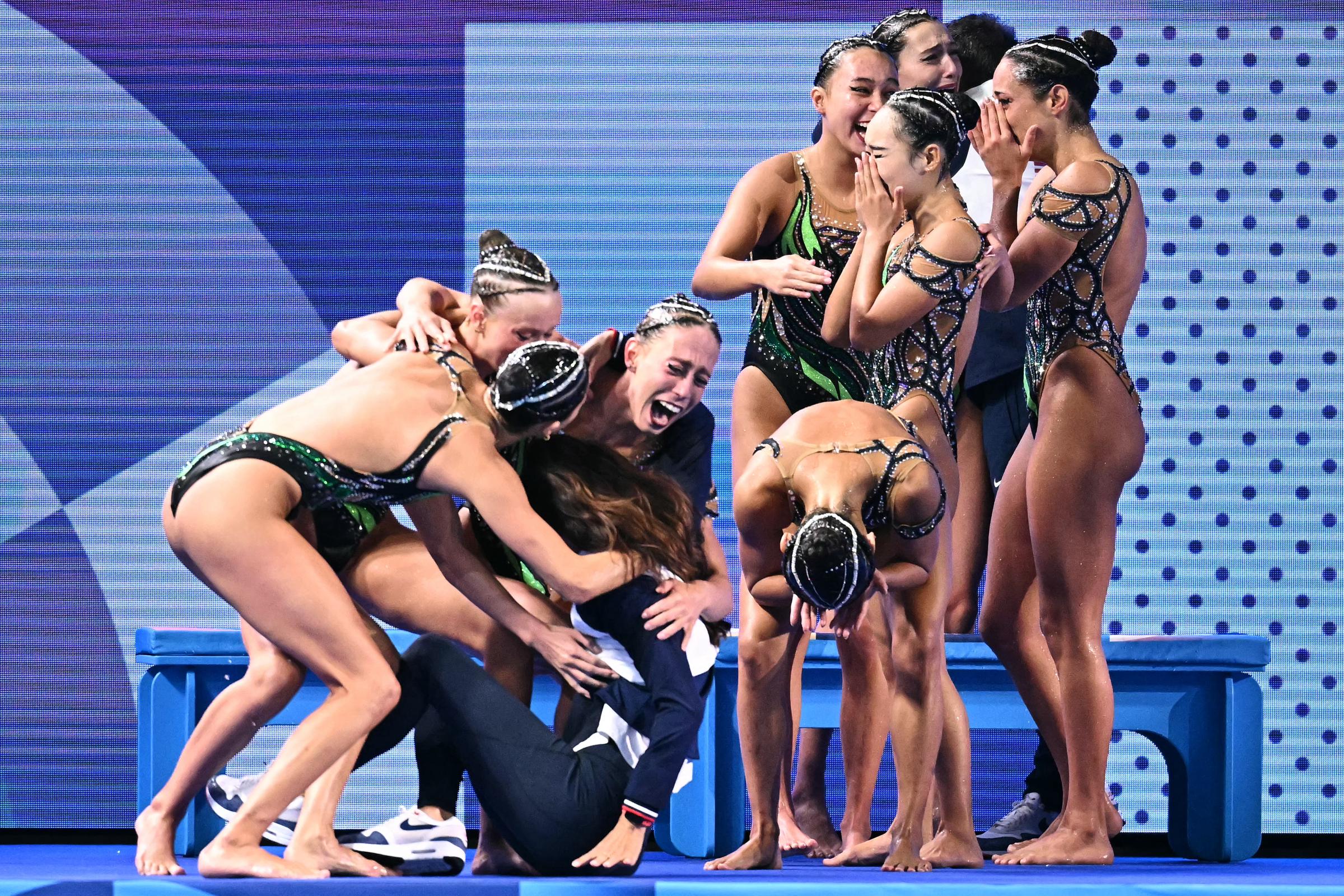
Team USA reacts after receiving their score in the team acrobatic routine of the artistic swimming event during the Paris 2024 Olympic Games in Saint-Denis, north of Paris, on August 7, 2024. | Source: Getty Images
Kwon also explained that they experimented with various exercises and techniques to improve their lifts, which proved to be successful. She mentioned attempting to jump as high as the diving board to touch it and performing long platform lifts, among other challenging tasks.
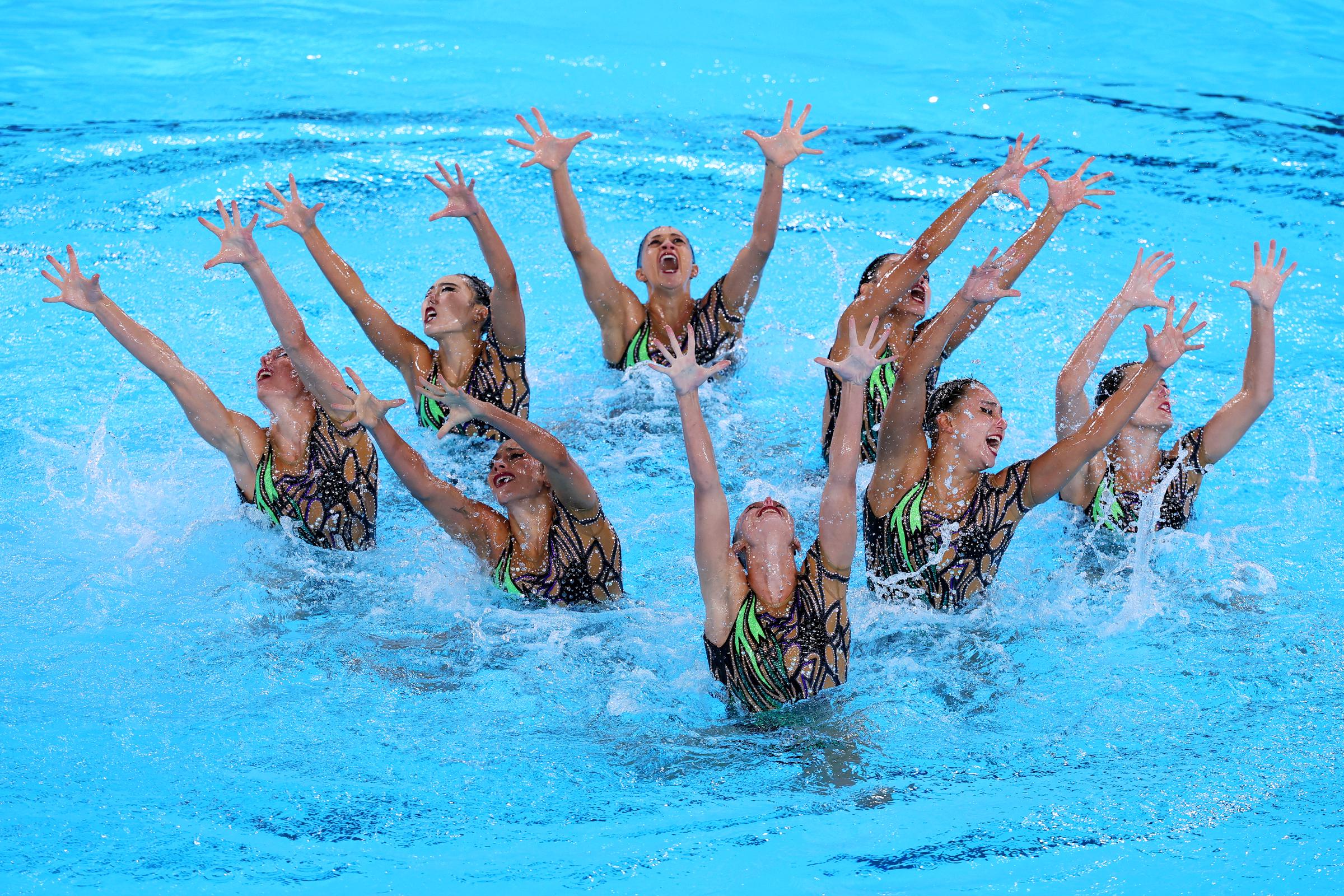
Members of Team USA compete in the Team Acrobatic Routine at the Olympic Games Paris 2024 in Paris, France, on August 7, 2024. | Source: Getty Images
Kwon’s hard work paid off as she was repeatedly lifted into the air, captivating the mesmerized audience with her performance. “I think over time, I learned to enjoy it more. Every day working on flying and acrobatics, I just got used to it. It does get a little scary sometimes, but it’s a lot better now,” noted Kwon.
To compete in artistic swimming at the Olympics, athletes need the grace of a dancer, the flexibility of a gymnast, and the lung capacity of a deep-sea diver. They also need to use a special mixture of gelatin and water, applied to their heads like shellac.
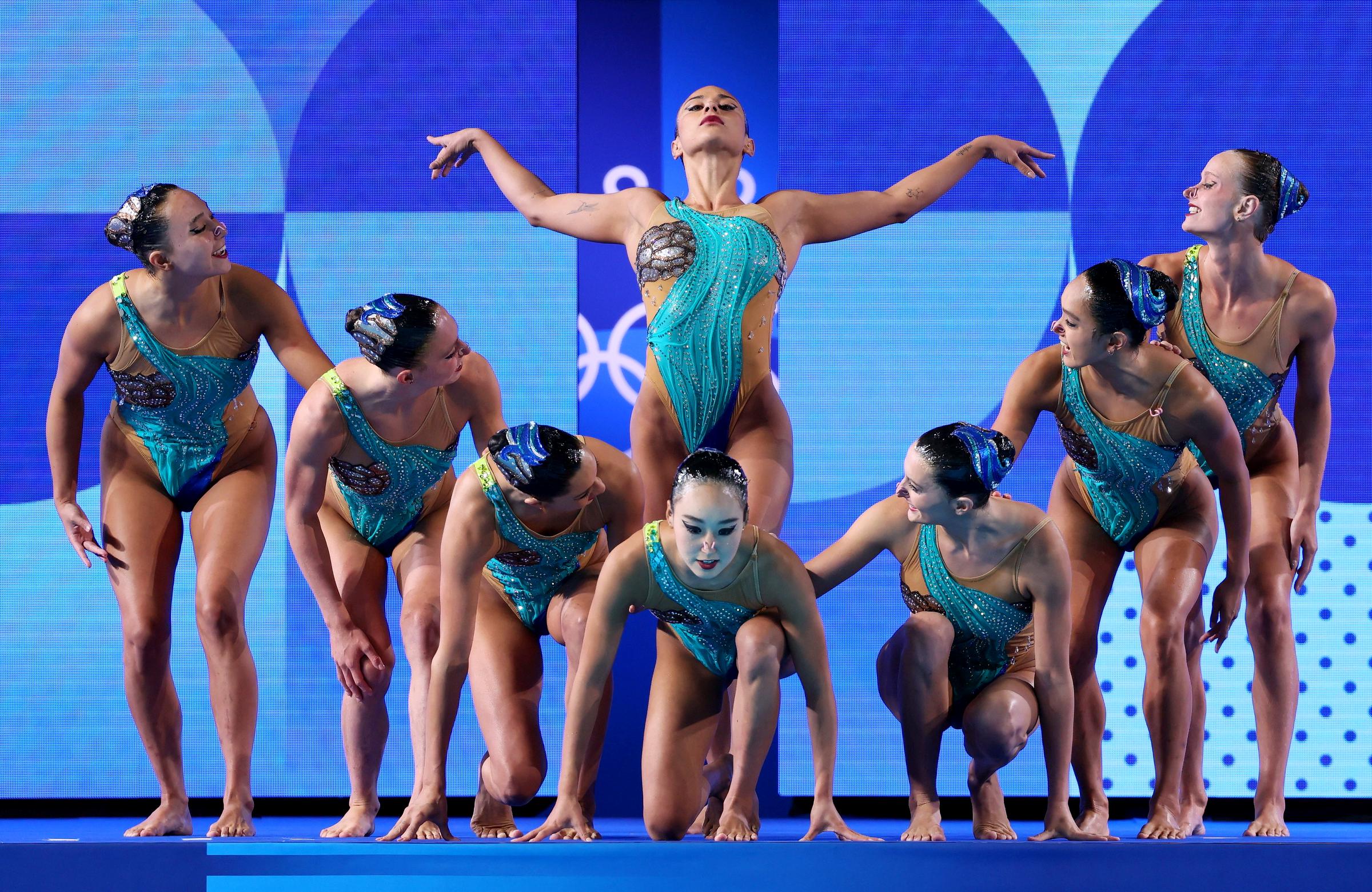
Team USA competes in the Team Free Routine at the Olympic Games Paris 2024 in Paris, France, on August 6, 2024. | Source: Getty Images
The routines themselves are demanding, but these unique requirements add another layer of complexity. Here are the four distinct demands of the sport.
1. How Do They Keep Their Hair and Makeup Well?
USA Team swimmers Alvarez and Mariya Koroleva have shared how they keep their hair and makeup well during artistic swimming competitions. The athletes explained that instead of swim caps, they use Knox gelatin in their hair during competitions.
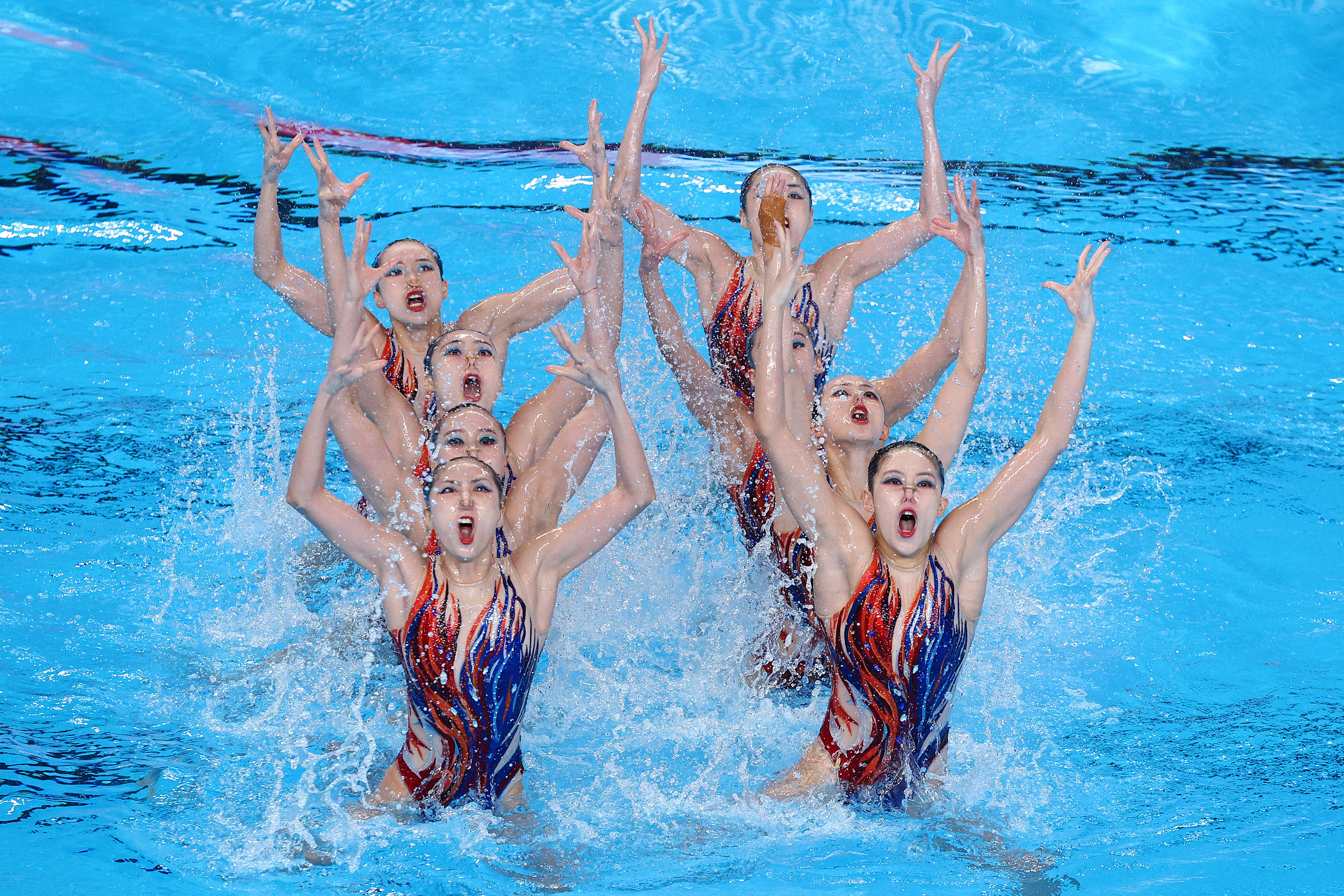
Hao Chang, Qianyi Wang, Yu Feng, Binxuan Xiang, Ciyue Wang, Yanning Xiao, Liuyi Wang, and Yayi Zhang of Team China compete in the Mixed Team Technical Preliminaries at the Doha 2024 World Aquatics Championships in Doha, Qatar, on February 5, 2024. | Source: Getty Images
This unflavored gelatin, mixed with water, creates a gooey substance that is combed or brushed into the hair. It is then styled into a bun and covered with a headpiece.

Daniella Ramirez shows the gelatin in her hair, from a TikTok video dated June 2, 2024 | Source: Tiktok/@annadramirez/
Once it dries, it becomes hard, ensuring the hair stays in place while swimming. They also add glitter and other decorations, finding the process straightforward and effective.
Canadian artistic swimmer Claire Scheffel also shared that solidified gelatin is crucial to the athletes’ elaborate hair and makeup routines. She noted that any issues like hair falling out or a headpiece coming off can be a significant stressor. “We really need to keep it all in place,” she added.
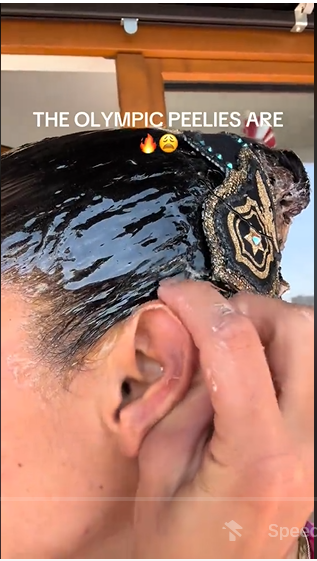
Daniella Ramirez shows the gelatin in her hair, from a TikTok video dated June 2, 2024 | Source: Tiktok/@annadramirez/
Nuria Diosdado of Mexico also emphasized, “It’s not enough to be good — you have to look perfect in your face, in your makeup, in your body.”
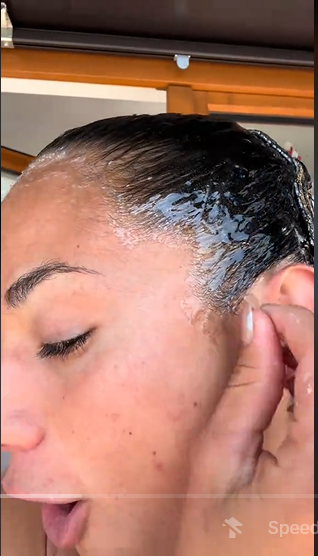
Daniella Ramirez shows the gelatin in her hair, from a TikTok video dated June 2, 2024 | Source: Tiktok/@annadramirez/
For instance, before competing Diosdado spent two hours getting ready. She applied gelatin to her hair and secured it with an intricate hairpiece.
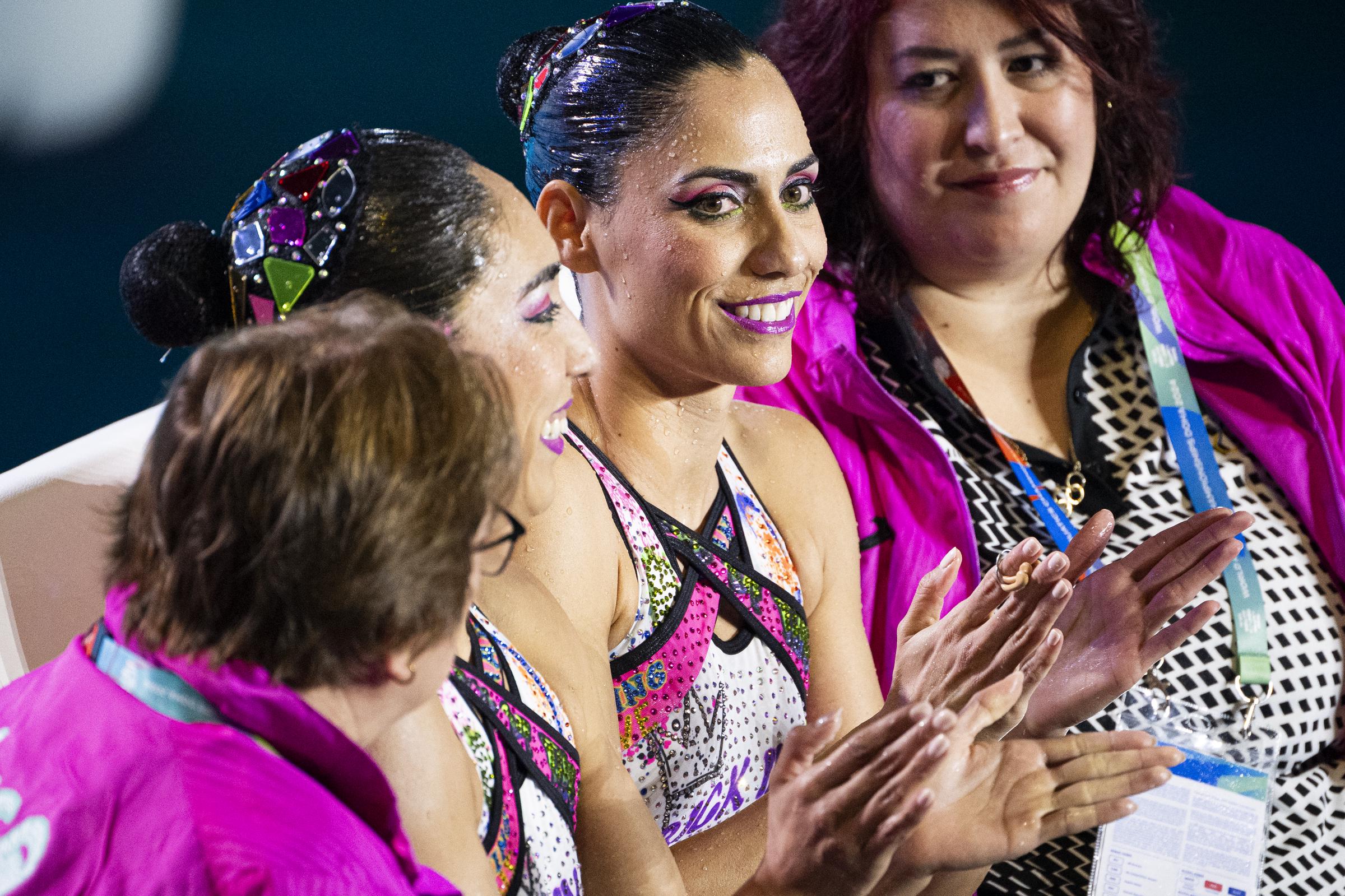
Nuria Diosdado Garcia and Joana Jimenez Garcia compete in the artistic swimming women’s duet technical final during the 21st World Aquatics Championships in Doha, Qatar, on February 5, 2024. | Source: Getty Images
She then did her waterproof makeup designed to be invisible to judges from across the pool. Lastly, Diosdado donned a sparkly swimsuit that resembled an aquatic drum majorette’s outfit.
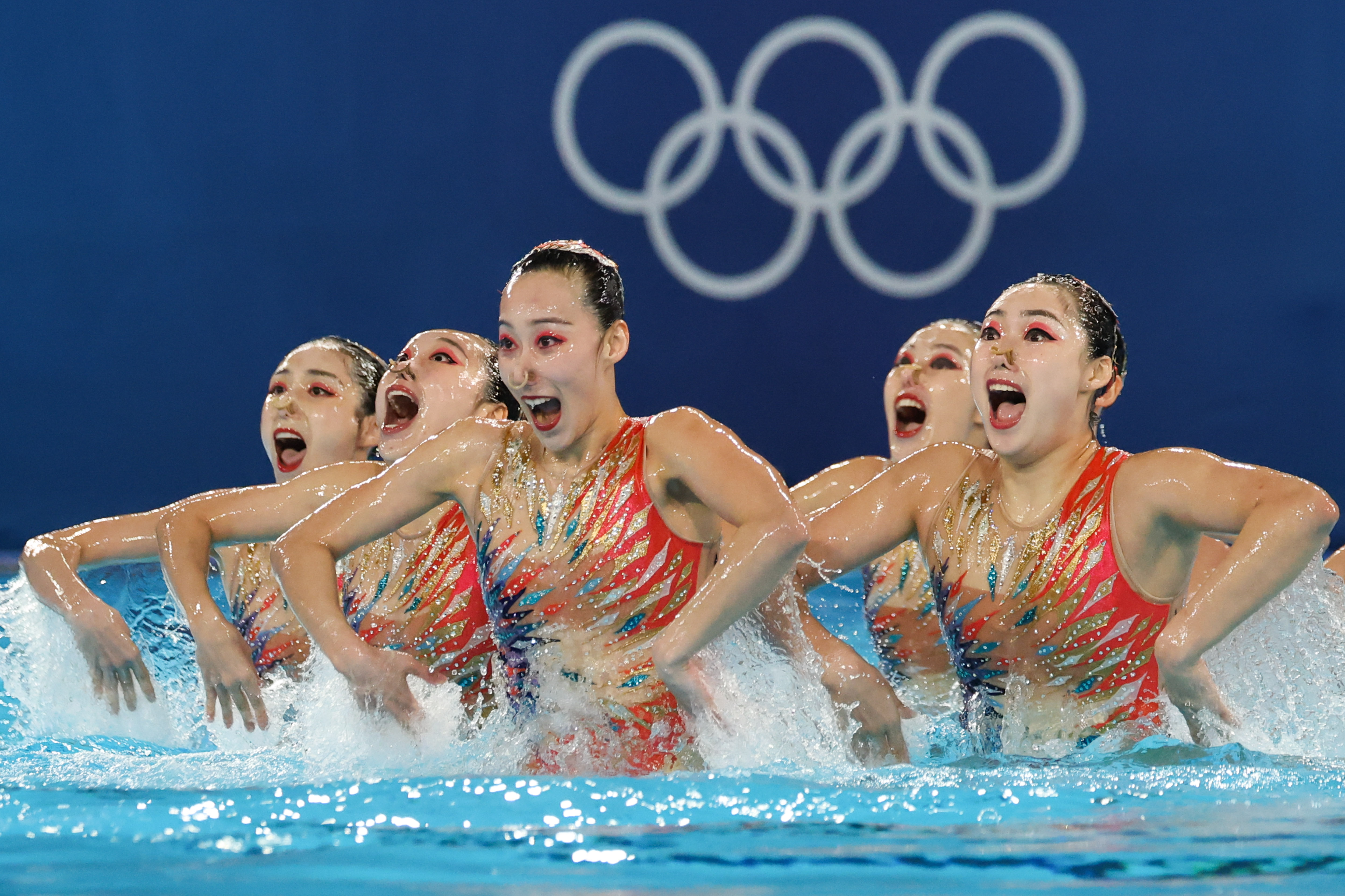
Gold medalists, Team China compete during the Artistic Swimming – Team Acrobatic Routine at the Paris 2024 Olympic Games in Saint-Denis, France, on August 7, 2024. | Source: Getty Images
After a competition, athletes tend to their hair, which is coated with a thick layer of hardened gelatin. Daniella Ramirez from the US has shared the process of removing this gelatin in a series of TikTok videos.

Daniella Ramirez shows the gelatin in her hair, from a TikTok video dated June 2, 2024 | Source: Tiktok/@annadramirez/
Her video, revealing the less glamorous side of her sport, has garnered nearly four million views. It features Ramirez carefully peeling off the gelatin from her head, a process she refers to as the “Olympic peelies.”
2. How Do They Keep Afloat?
Artistic swimmers are required to avoid touching the bottom of the pool during their routines, as doing so results in a two-point deduction. The pool is at least nine feet deep, and the swimmers achieve the appearance of standing on their feet or hands through advanced techniques.
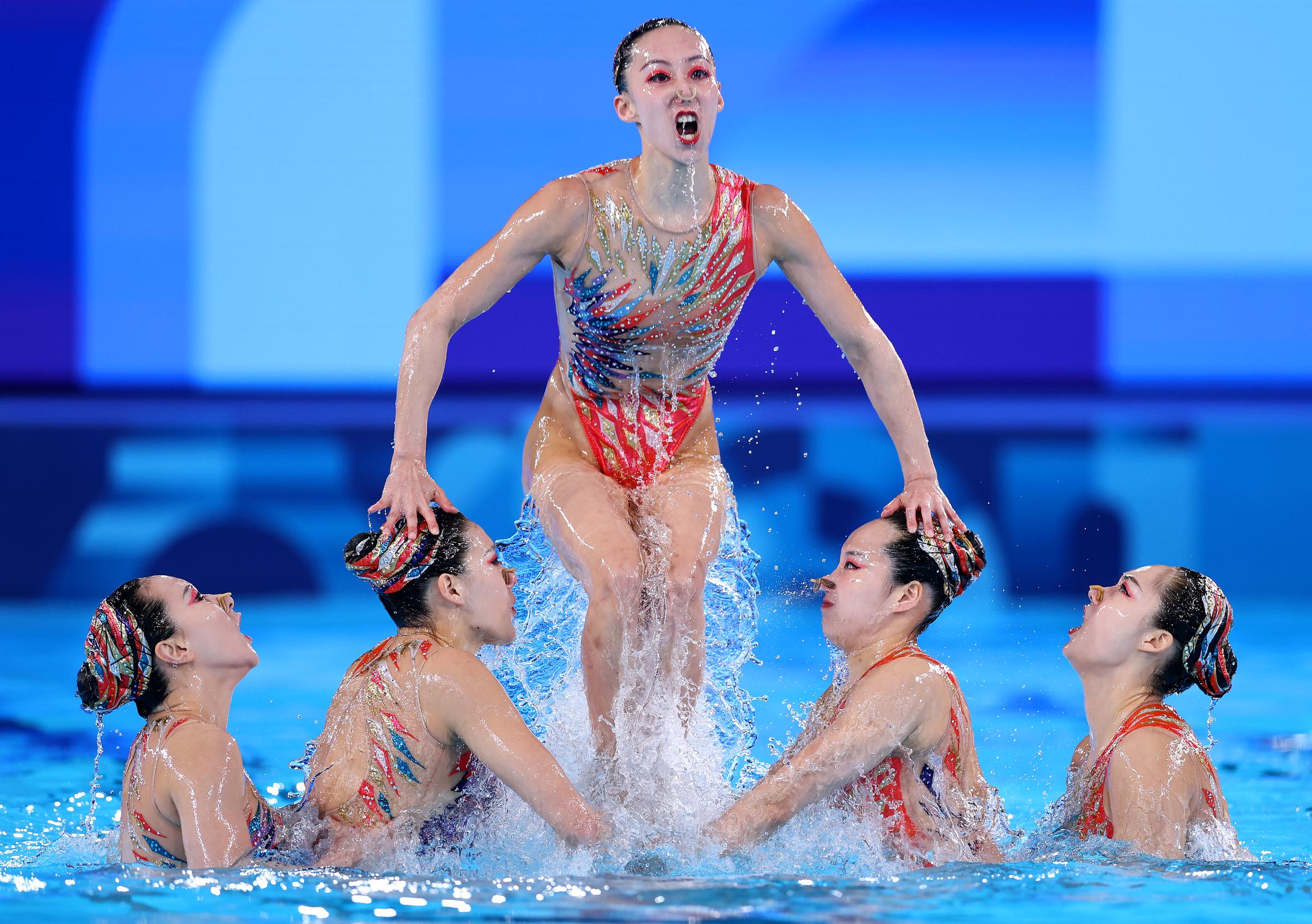
Members of Team China compete in the Team Acrobatic Routine at the Olympic Games Paris 2024 in Paris, France, on August 7, 2024. | Source: Getty Images
They use eggbeatering, a circular motion of the legs that helps maintain their position at the surface. They also utilize sculling, a technique involving small, precise hand movements to control their buoyancy and stability in the water.
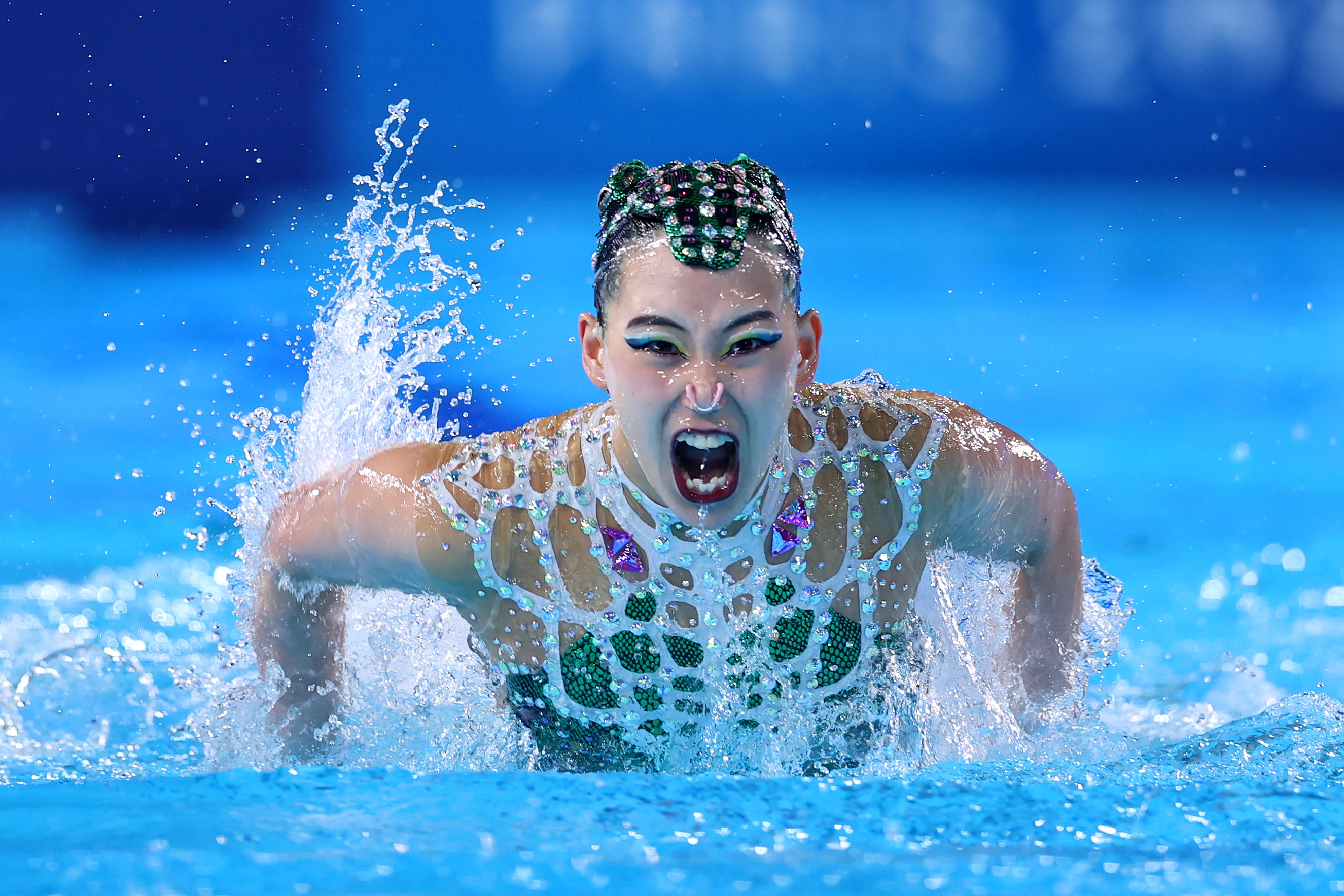
A member of Team Japan competes in the Team Acrobatic Routine at the Olympic Games Paris 2024 in Paris, France, on August 7, 2024. | Source: Getty Images
In a five-minute routine, an artistic swimmer might spend up to a minute underwater without surfacing for air. During this time, they use their arms and legs to stay buoyant and maintain their position. This is akin to running underwater while simultaneously holding your breath.
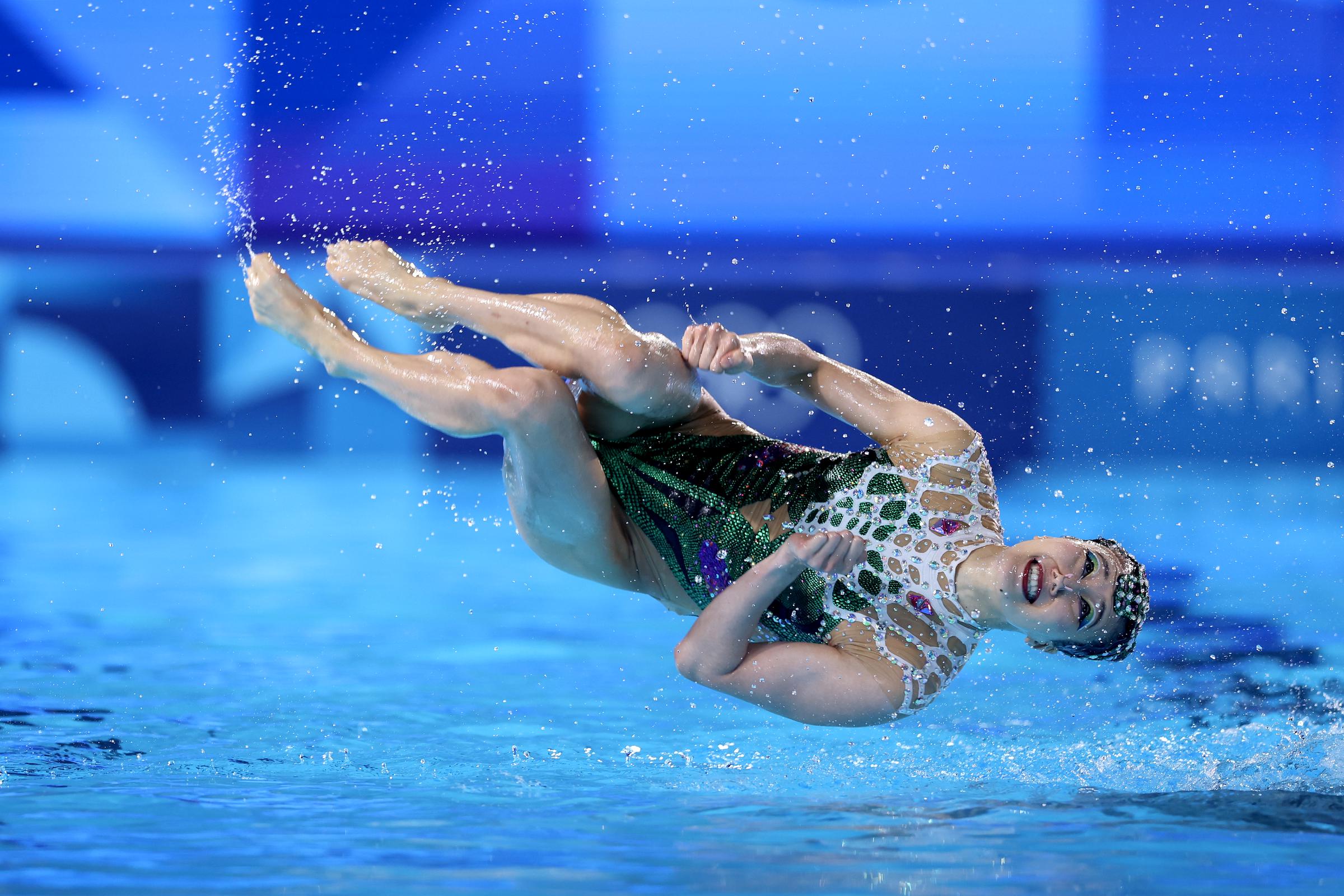
A member of Team Japan competes in the Team Acrobatic Routine at the Olympic Games Paris 2024 in Paris, France, on August 7, 2024. | Source: Getty Images
Thus, artistic swimmers must perform tasks similar to those of gymnasts and acrobats. The main difference is they do this while being upside down and holding their breath for up to two minutes.
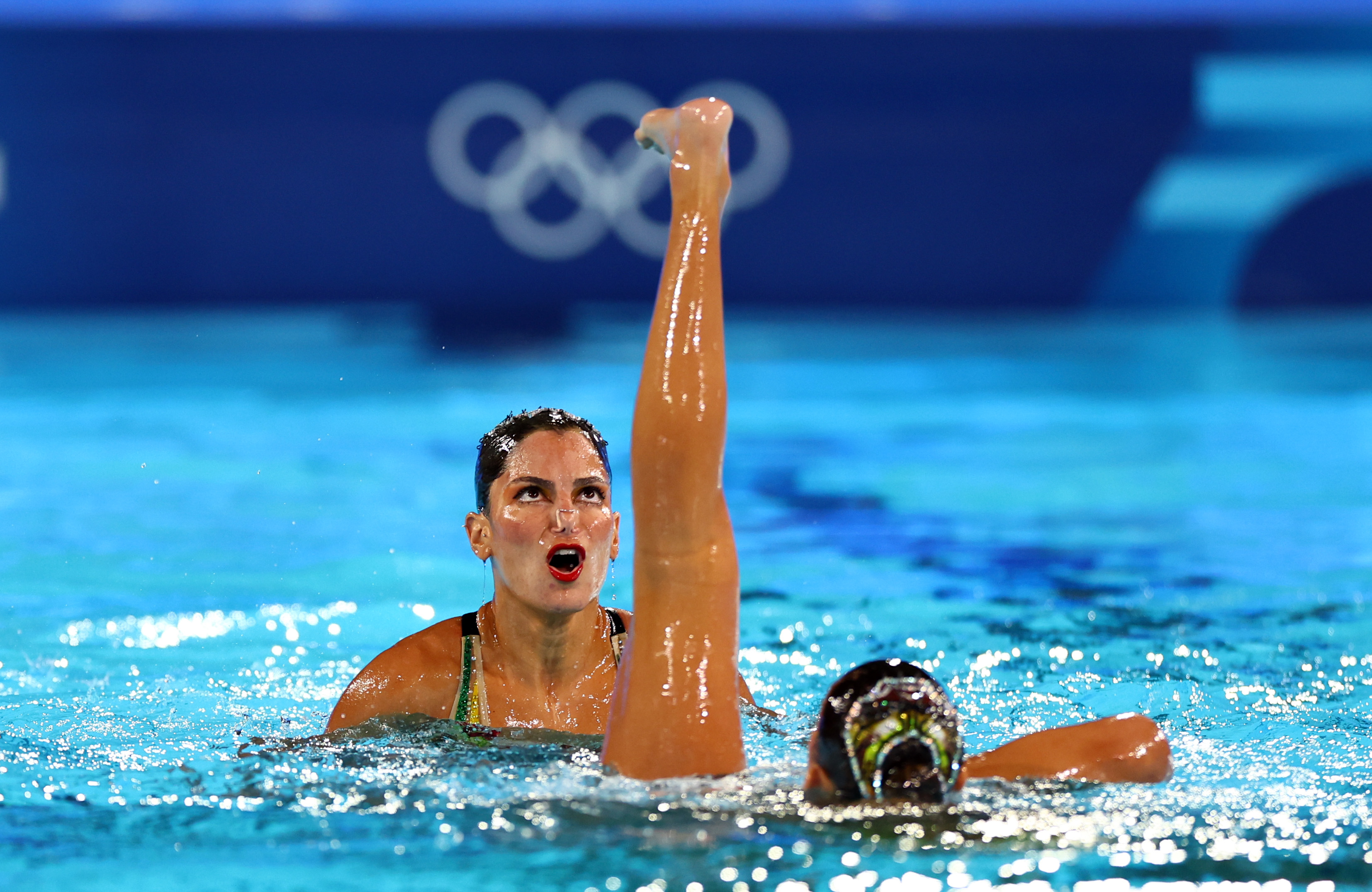
Members of Team Egypt compete during the Artistic Swimming in the team Free Routine at the Olympic Games Paris 2024 in Paris, France, on August 6, 2024. | Source: Getty Images
They must also synchronize their movements with both the music and their teammates. Even a small mistake can disrupt the entire routine.
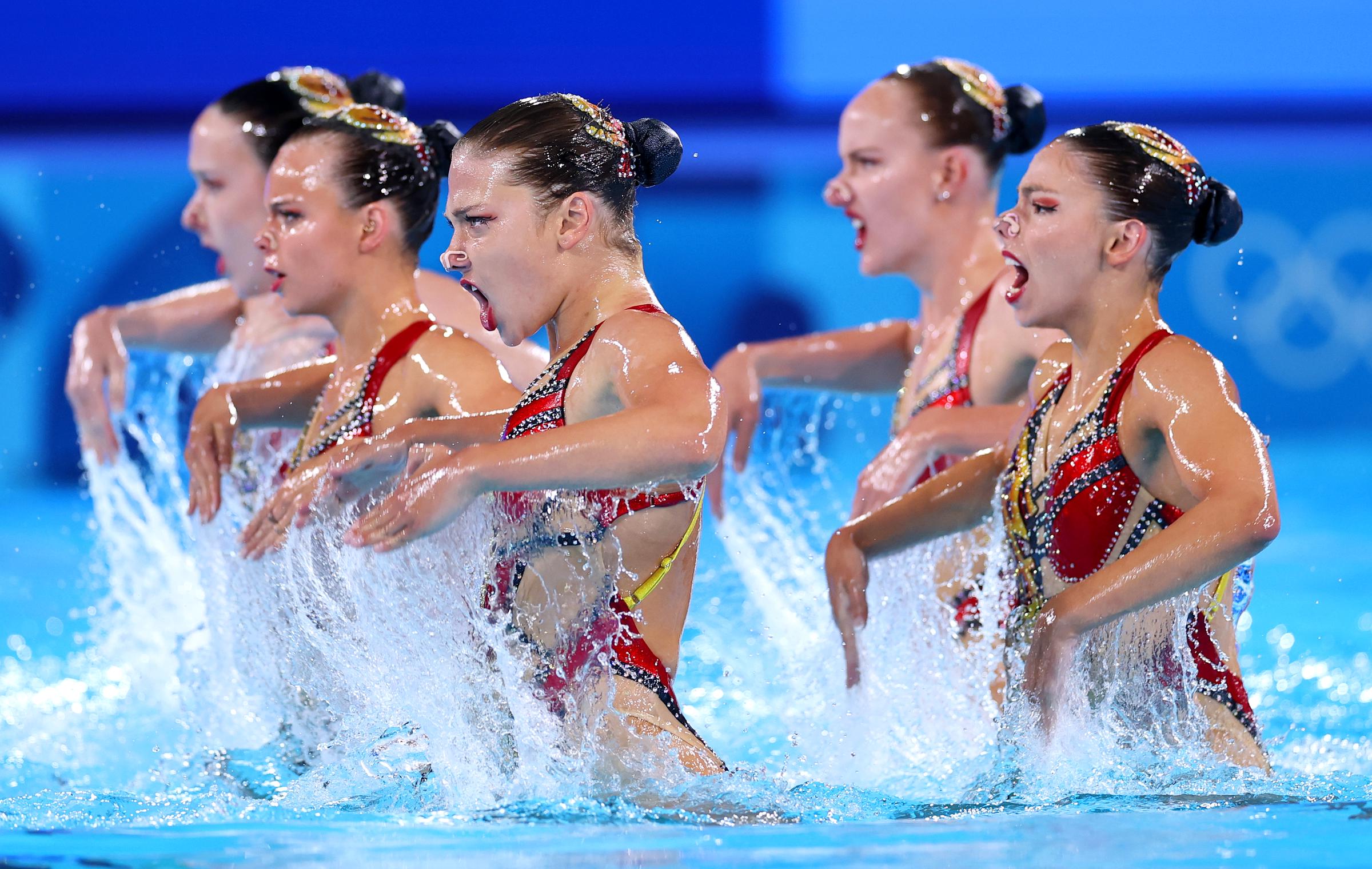
Members of Team Canada compete in the Team Acrobatic Routine at the Olympic Games Paris 2024 in Paris, France, on August 7, 2024. | Source: Getty Images
3. Why Do They Use Nose Clips?
Fans may have seen the artistic swimmers with nose clips, which is the most essential piece of equipment in artistic swimming.
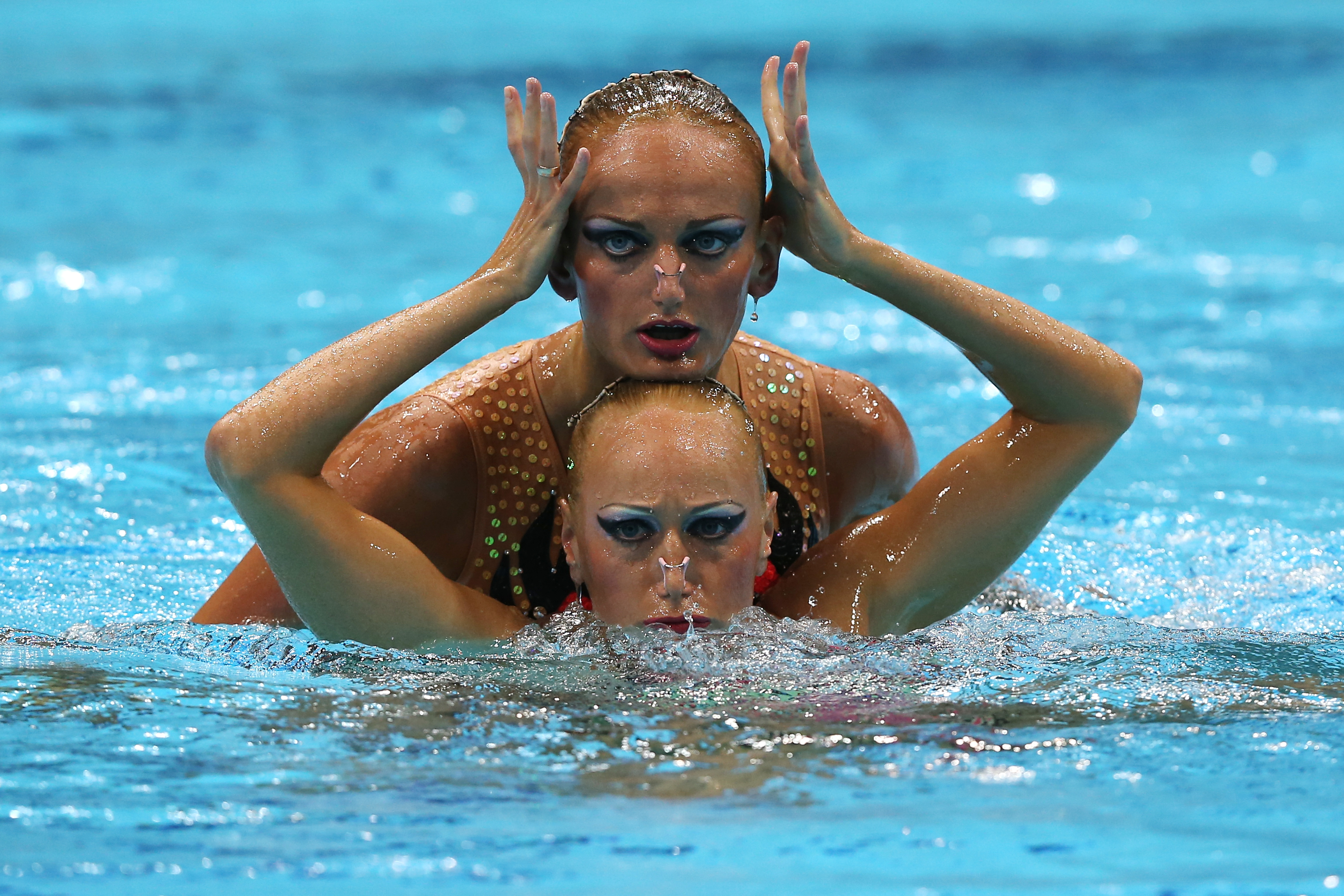
Daria Iushko and Kseniya Sydorenko of Ukraine compete in the Women’s Duets Synchronised Swimming Free Routine Final at the London 2012 Olympic Games in London, England, on August 7, 2012. | Source: Getty Images
While it might seem unusual, it is crucial because it prevents water from entering the nasal cavity during challenging upside-down movements.
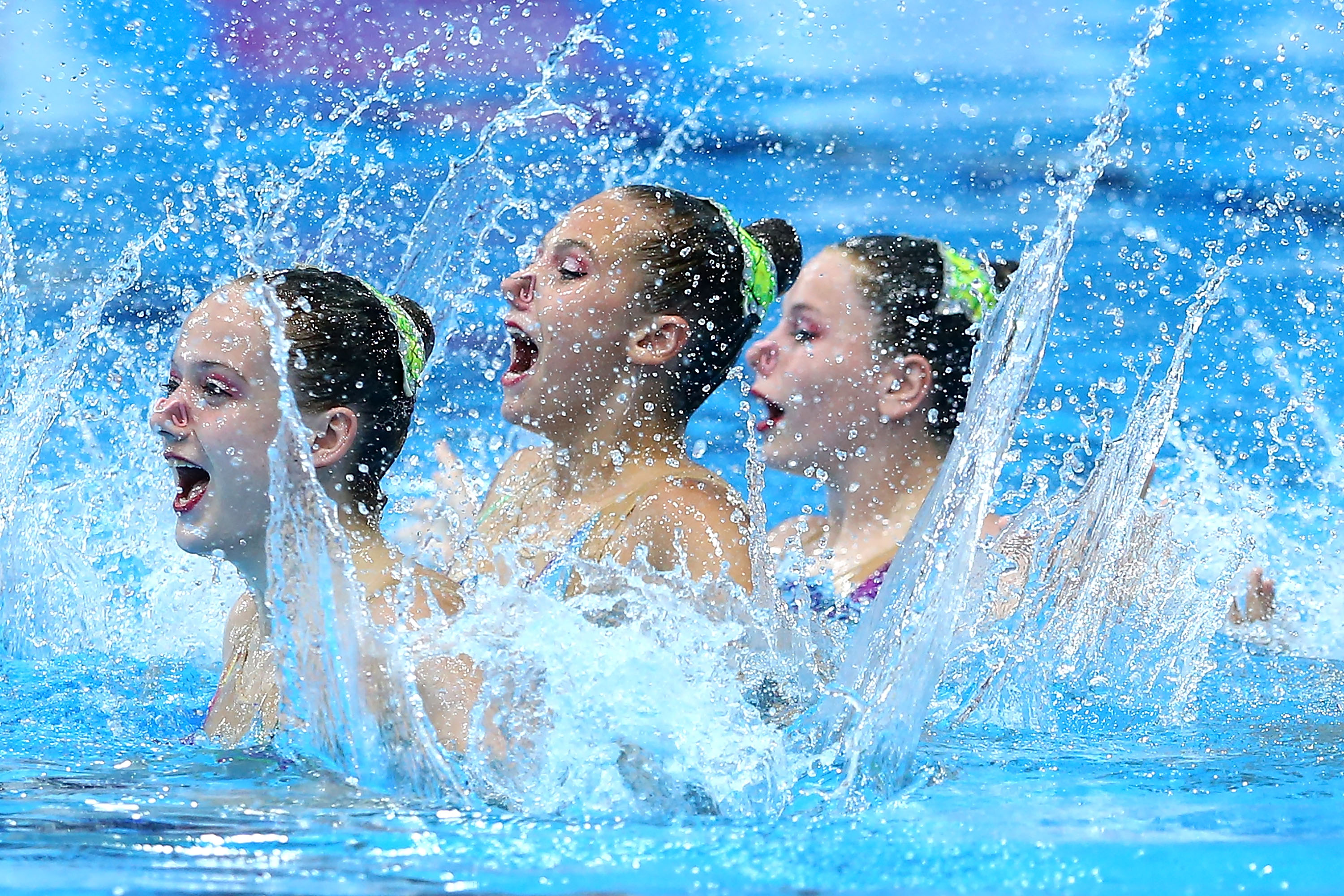
The England Talent team compete in the Preliminary round of the Team Free Routine during the Synchronised Swimming at the European Championships Glasgow 2018 in Glasgow, Scotland, on August 3, 2018. | Source: Getty Images
So, the nose clip allows swimmers to stay underwater for longer durations, making it an indispensable tool for their routines.
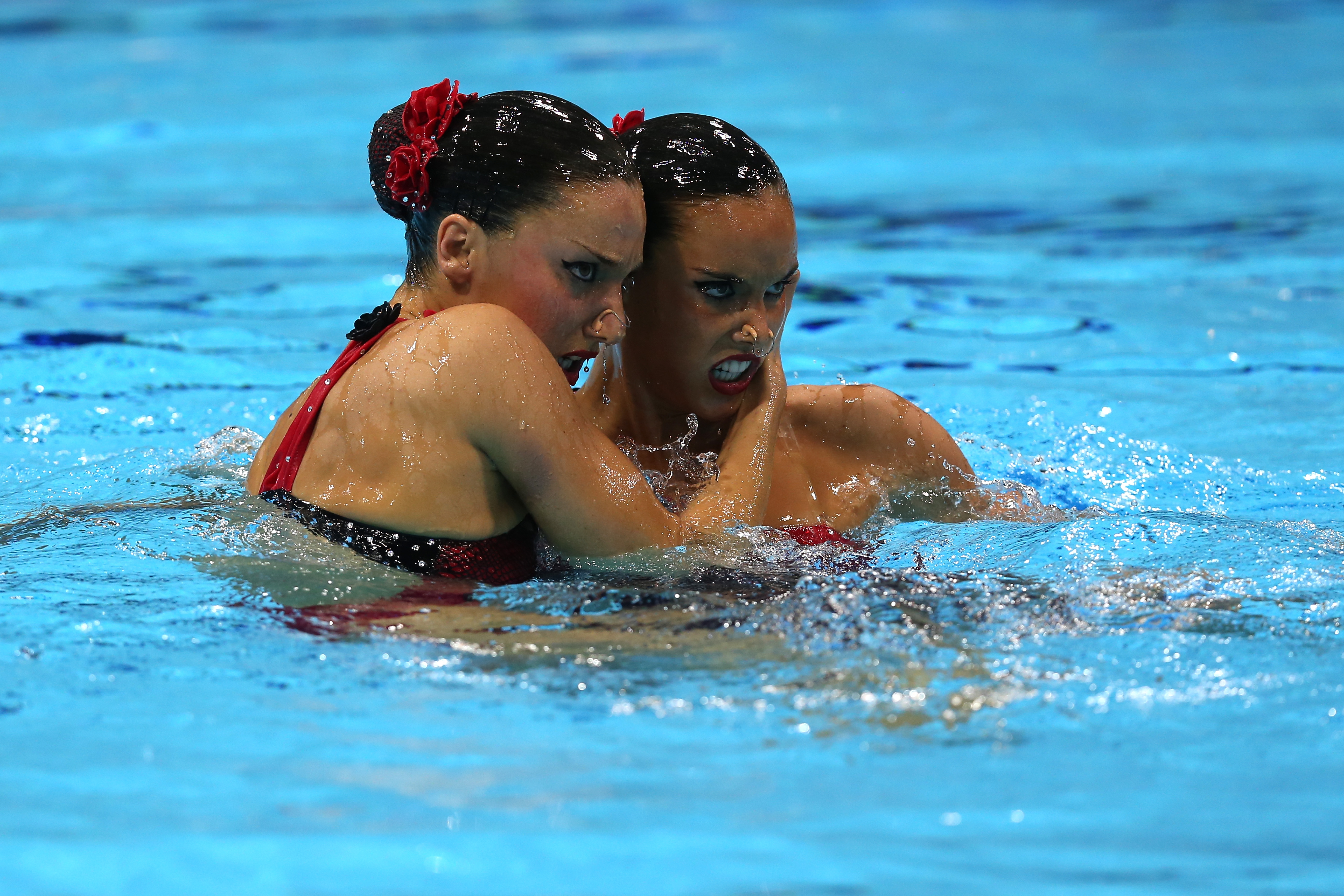
Ballestero Carbonell and Andrea Fuentes Fache of Spain compete in the Women’s Duets Synchronised Swimming Free Routine Final at the London 2012 Olympic Games in London, England, on August 7, 2012. | Source: Getty Images
4. Are Men Allowed to Partake in It?
In late 2022, the International Olympic Committee (IOC) revealed that men would be allowed to compete in artistic swimming at the 2024 Paris Olympic Games. This decision marked a significant shift from the sport’s long-standing reputation as a women’s sport.
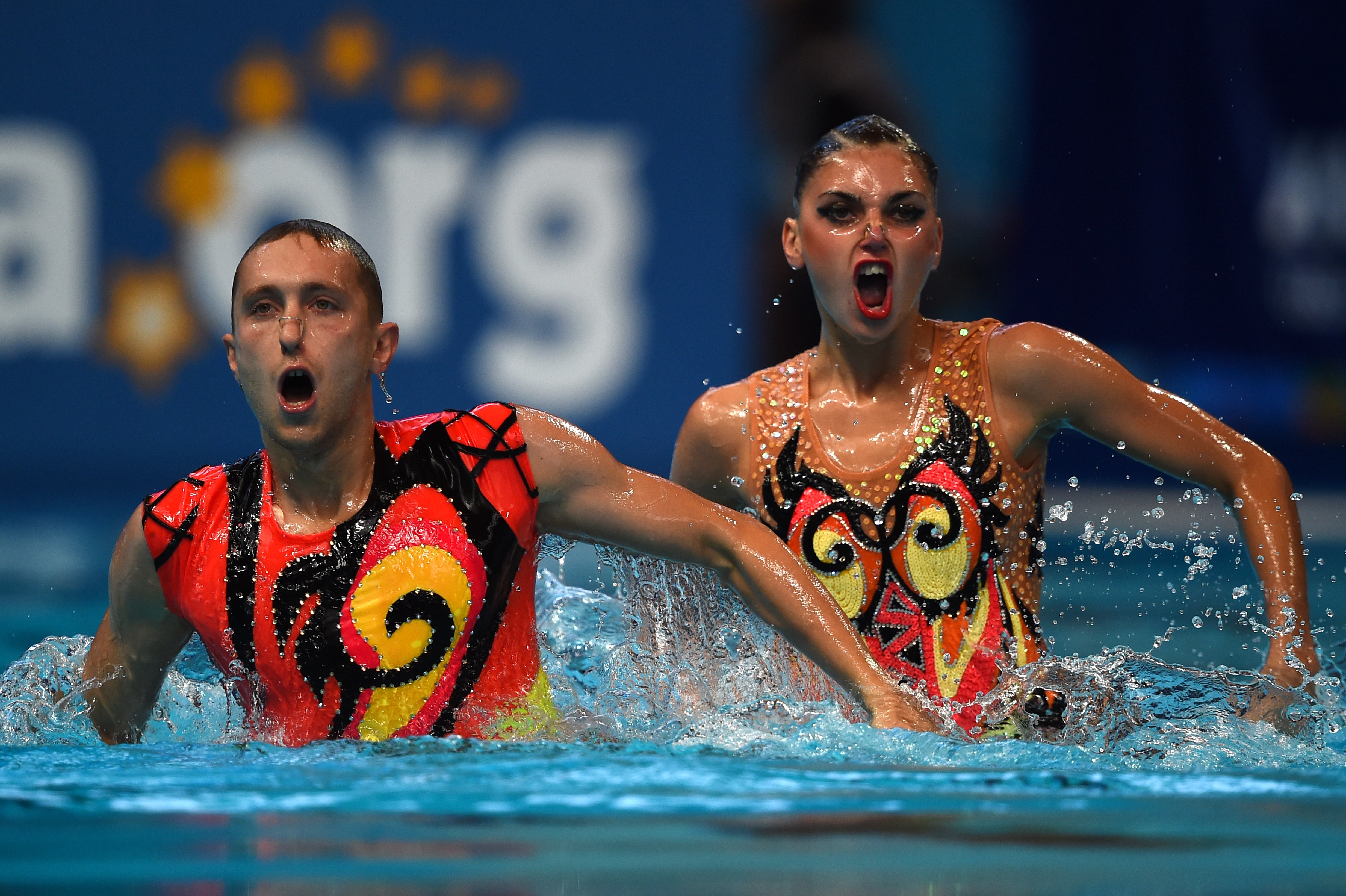
Ukraine’s mixed duet Oleksandra Sabada and Anton Timofeyev compete in the Mixed duet Free preliminary event during the synchronized swimming competition at the 2015 FINA World Championships in Kazan, on July 28, 2015. | Source: Getty Images
This classification was established by the IOC when artistic swimming was first included in the Olympics in 1984, exclusively for female competitors. For the next nine Olympiads, the sport remained limited to women.
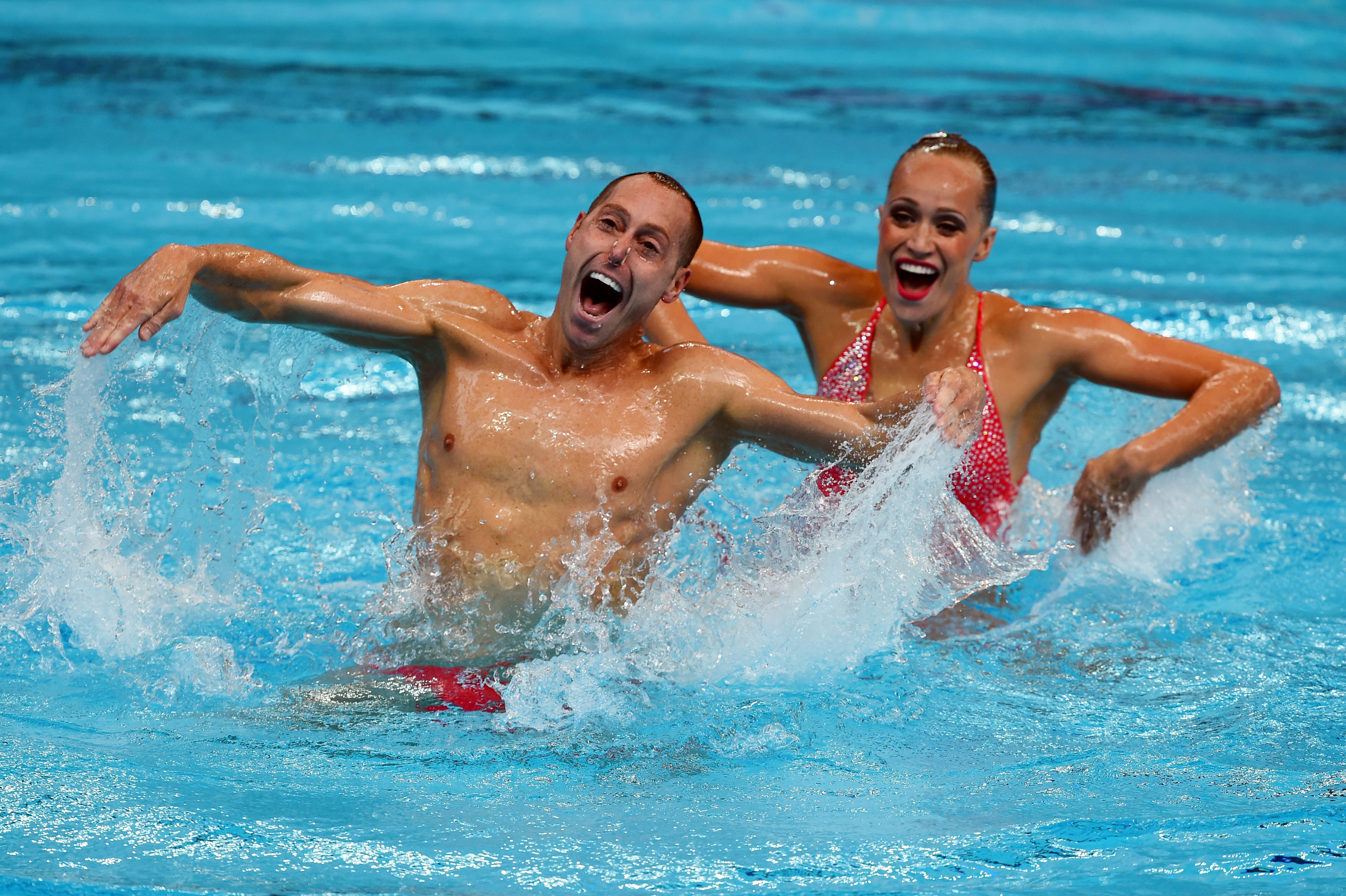
US synchronized swimming duet Christina Jones and Bill May compete in the Mixed Duet Technical preliminary during the synchronized swimming competition at the 2015 FINA World Championships in Kazan, on July 25, 2015. | Source: Getty Images
Bill May, a national champion in the US from the 1990s, was happy with the IOC’s announcement. May shared that receiving the news felt like “my heart exploded.”
At 44 years old, he came out of retirement and rejoined the US Senior National Artistic Swimming Team, determined to fulfill his long-held Olympic dream.
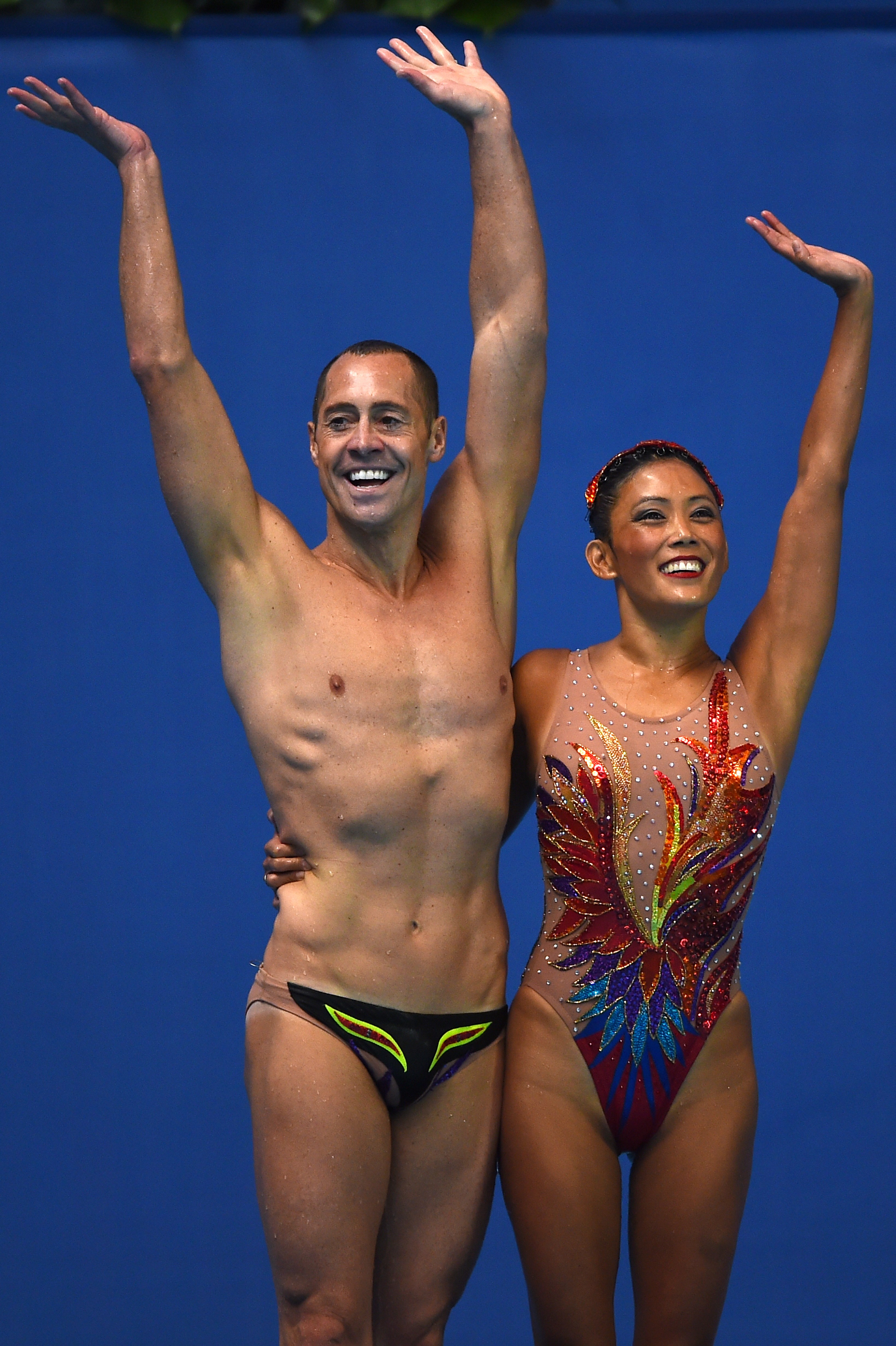
US mixed duet Kristina Lum-Underwood and Bill May wave after competing in the Mixed duet Free preliminary event during the synchronized swimming competition at the 2015 FINA World Championships in Kazan, on July 28, 2015. | Source: Getty Images
May helped the USA Team qualify for the 2024 Paris Olympics Games. However, the team decided not to select any men for its Olympic roster. So, as much as men are now allowed to compete, there were officially no men competing in artistic swimming at Paris 2024 for Team USA.
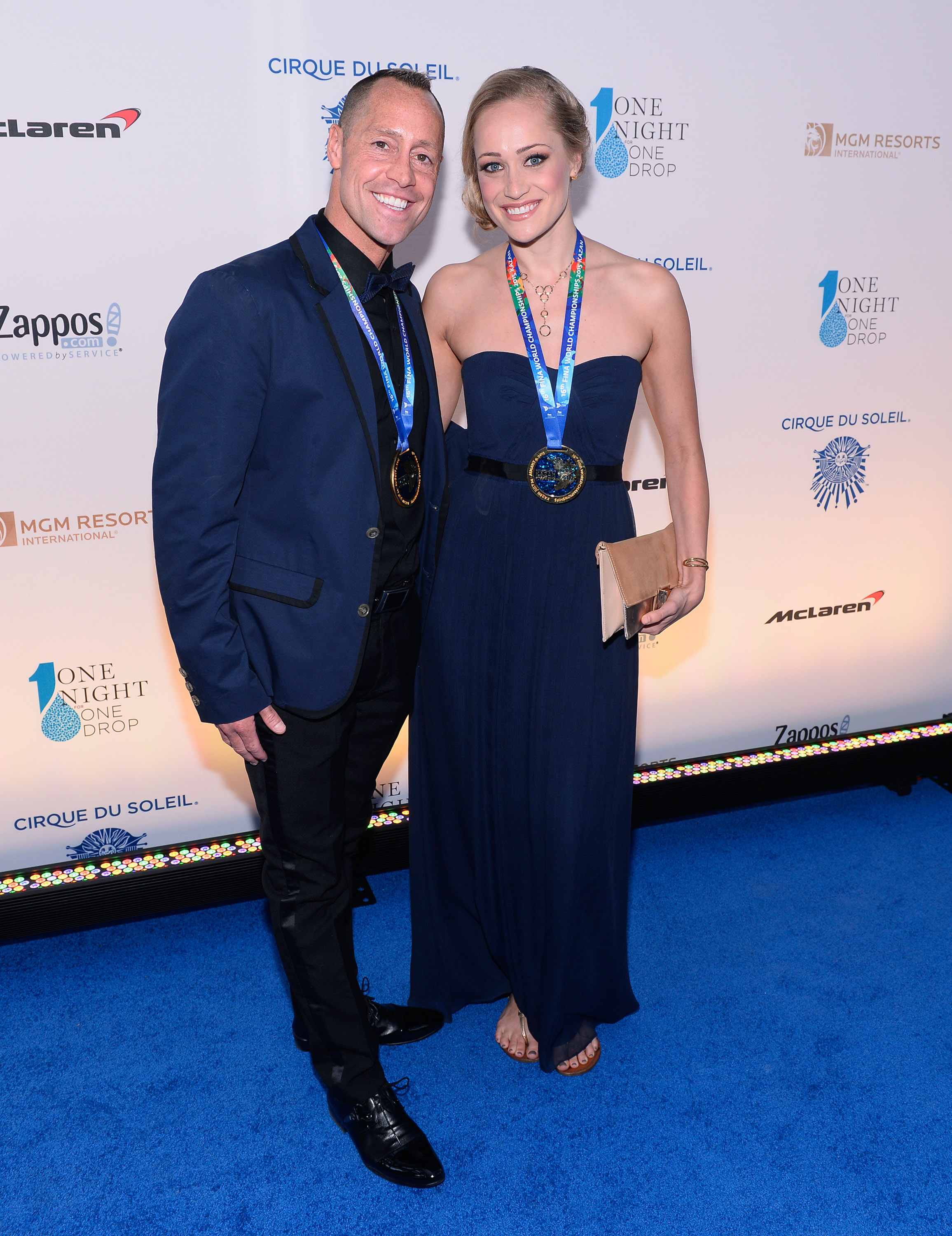
FINA gold medalists and synchronized swimmers Billy May and Christina Jones attend the fourth annual “One Night for ONE DROP” imagined by Cirque du Soleil in Las Vegas, Nevada, on March 18, 2016. | Source: Getty Images
Artistic swimming’s evolution, including the recent inclusion of men in competitions, continues to push the boundaries of what’s possible in this sport.
The athletes’ remarkable skills, combined with the sport’s unique demands, continue to captivate audiences, making it one of the most beloved events at the Olympics.



